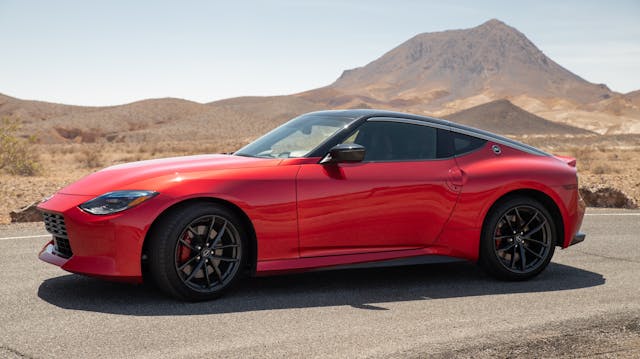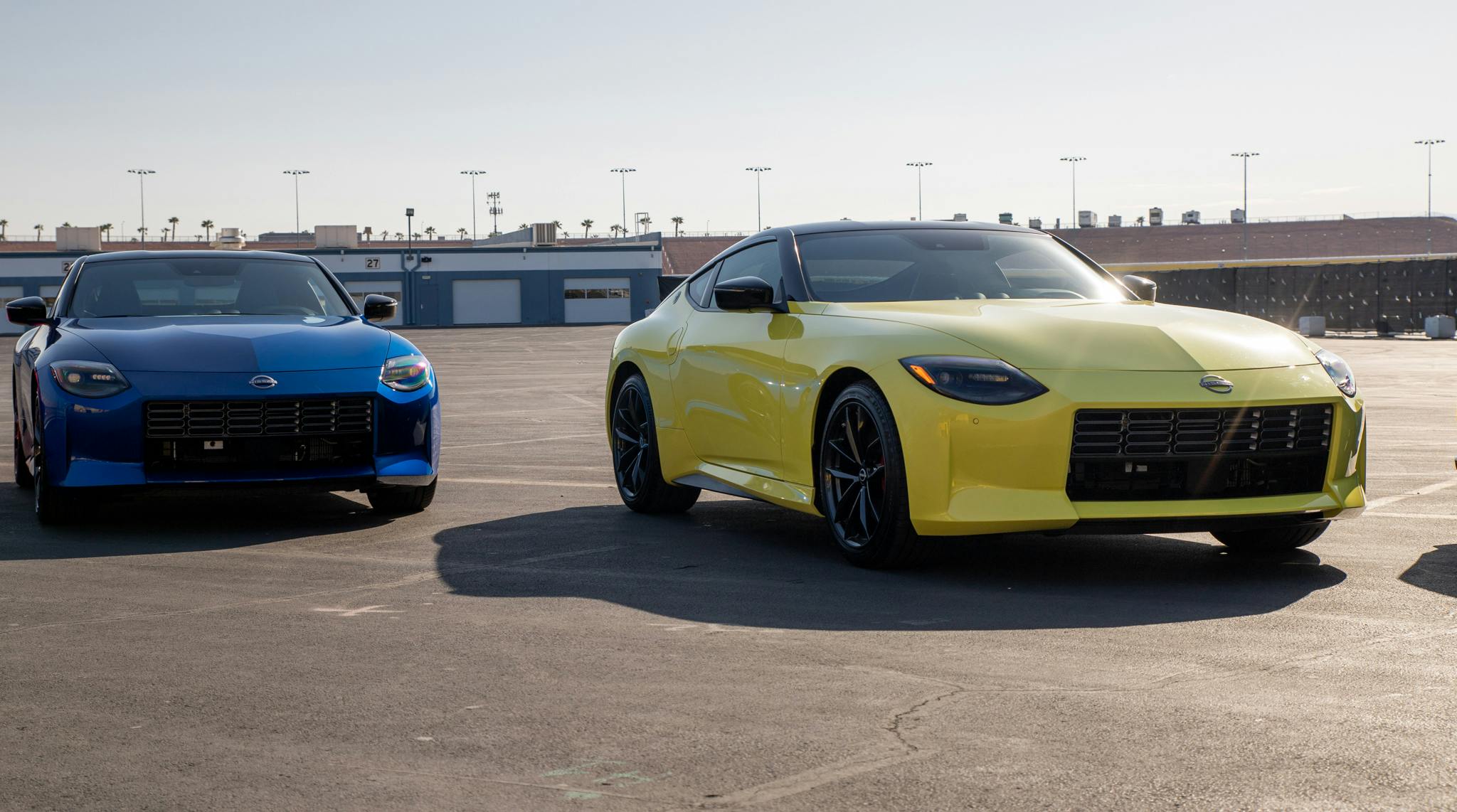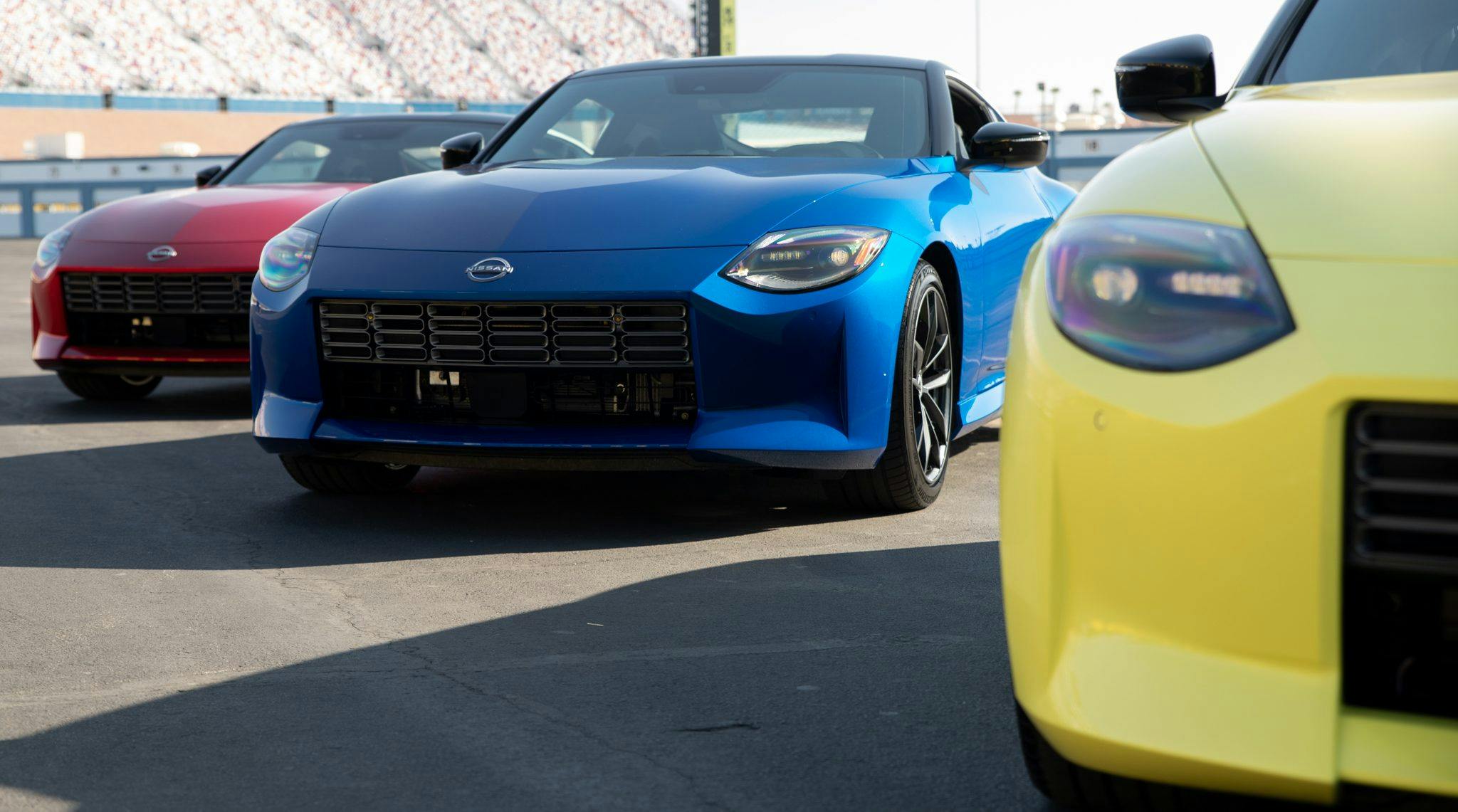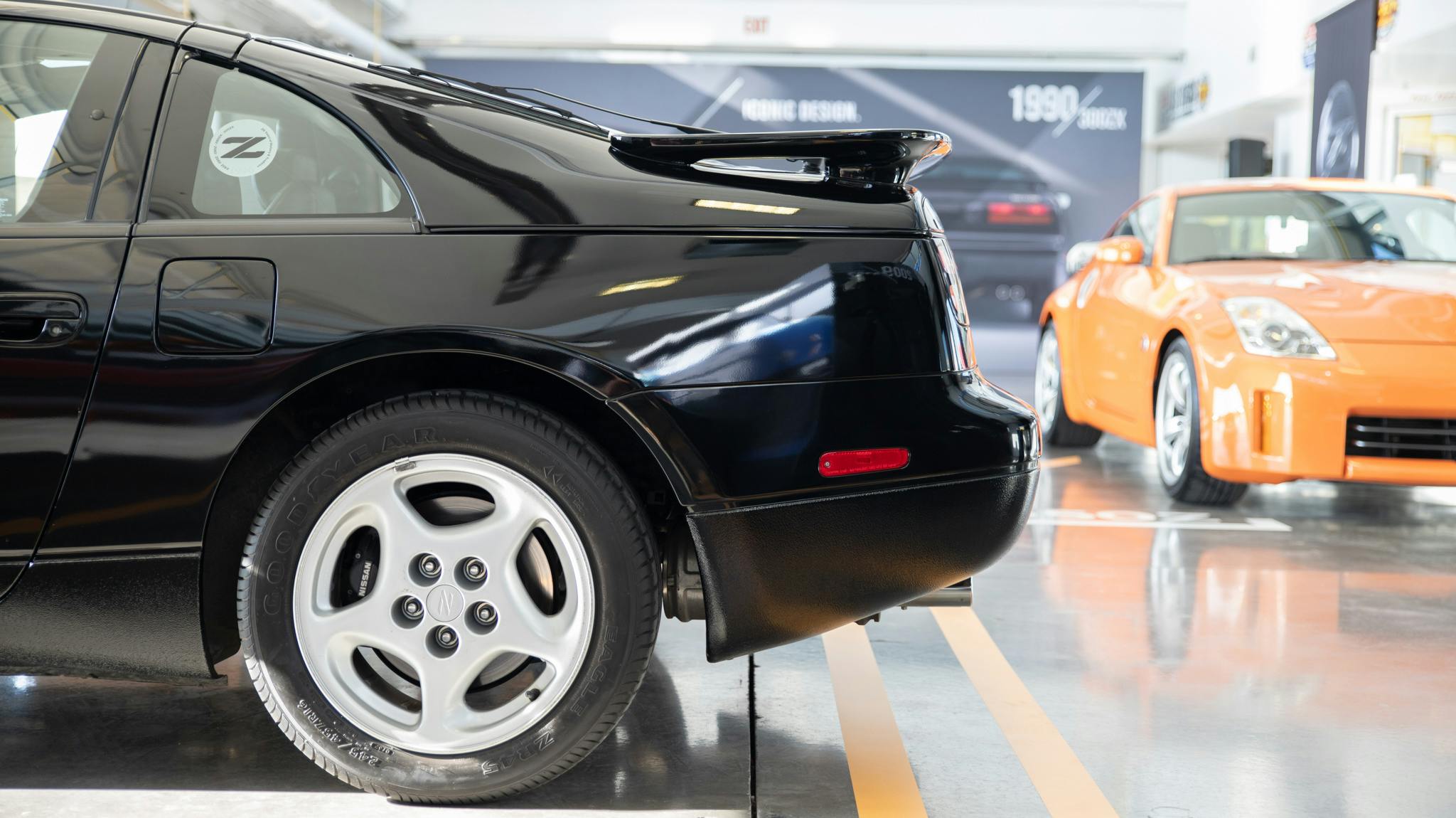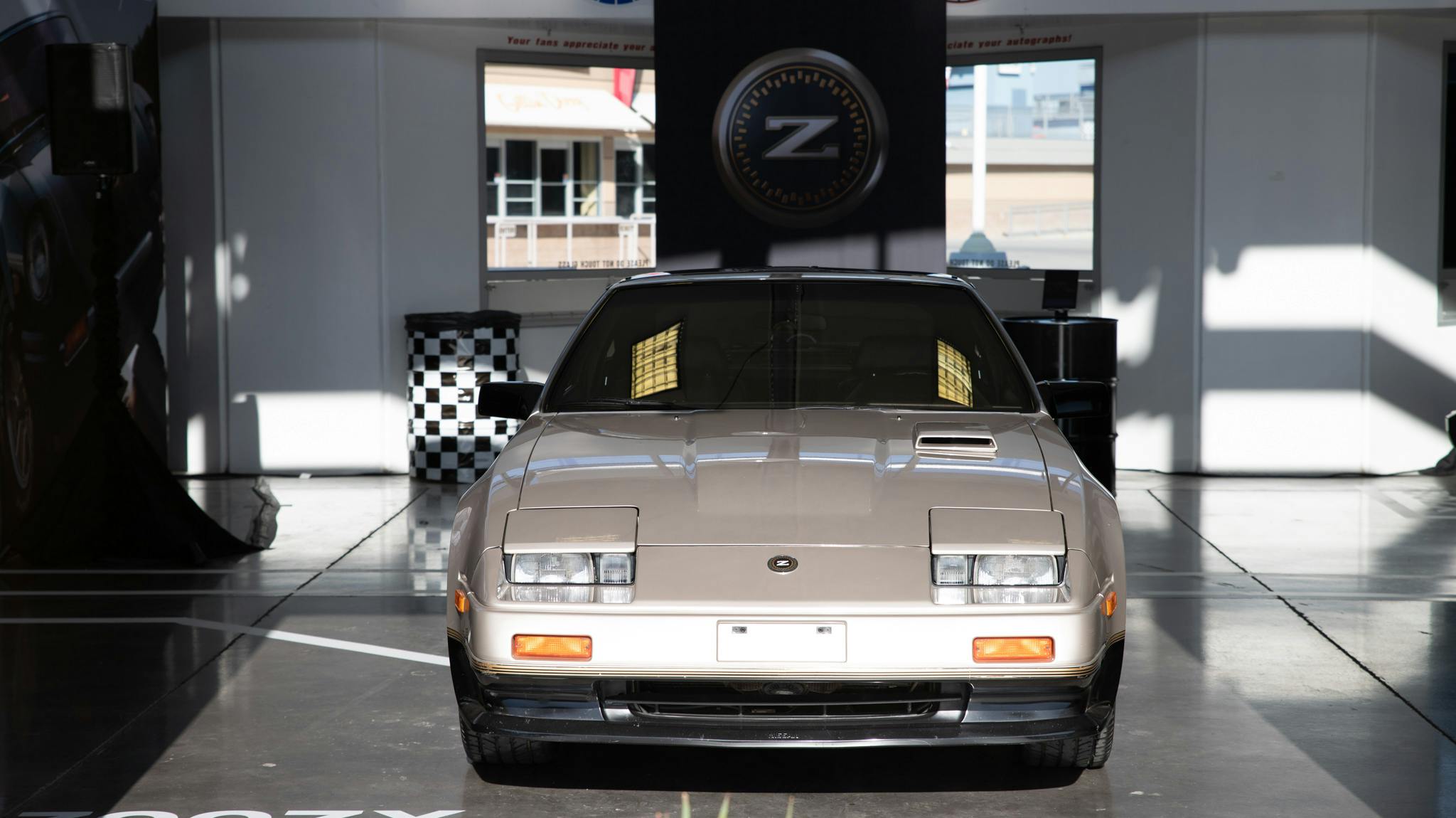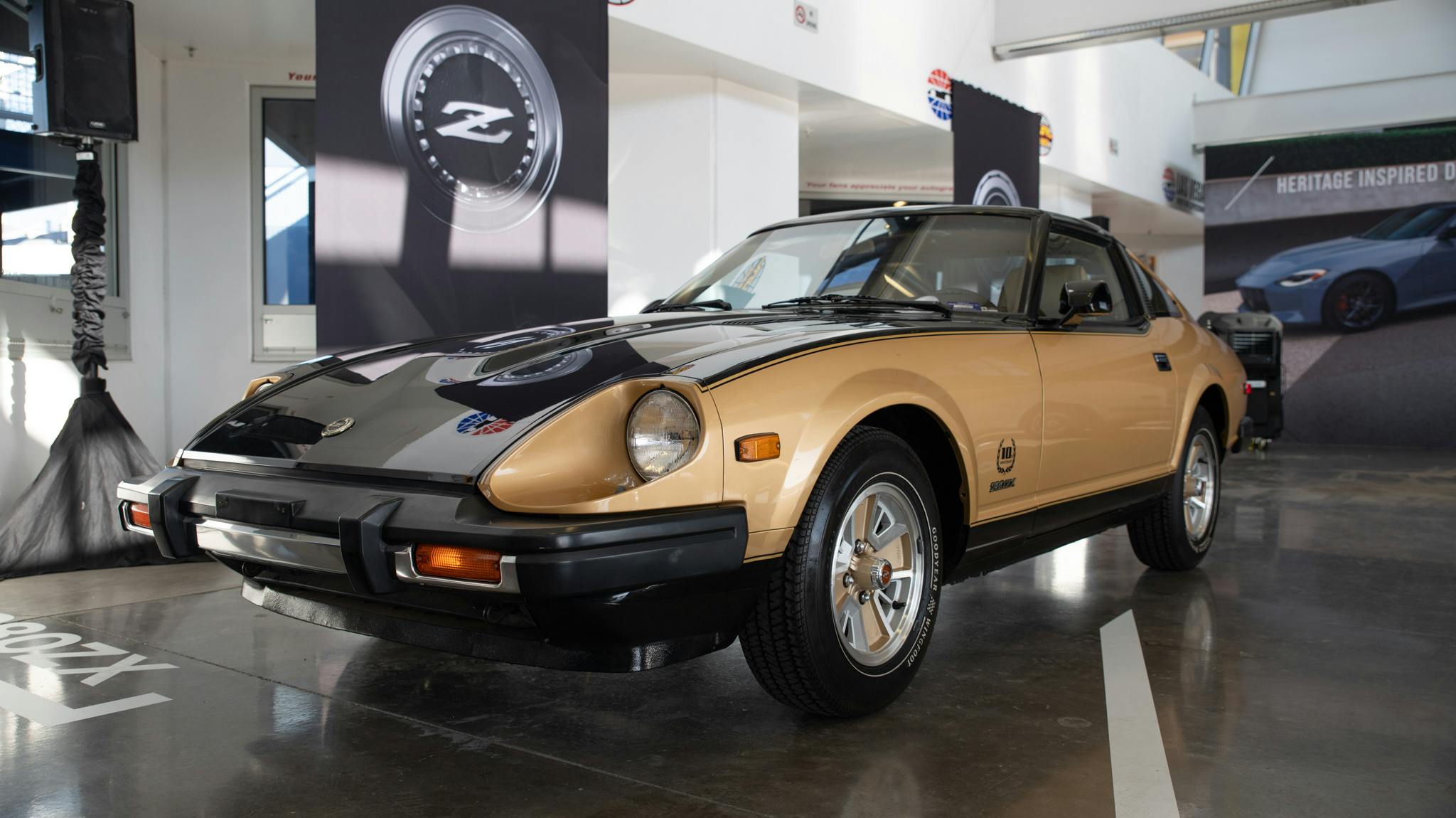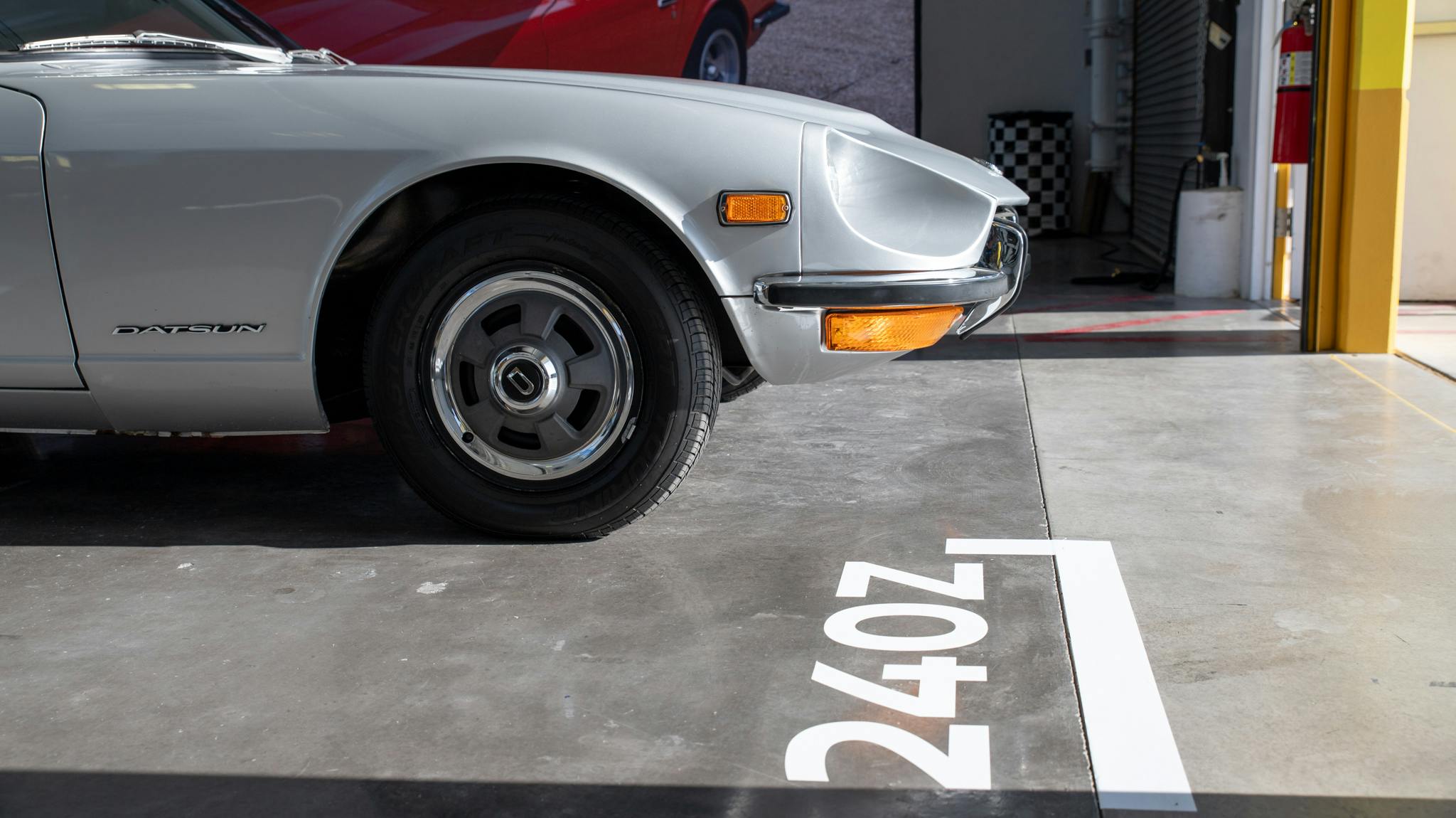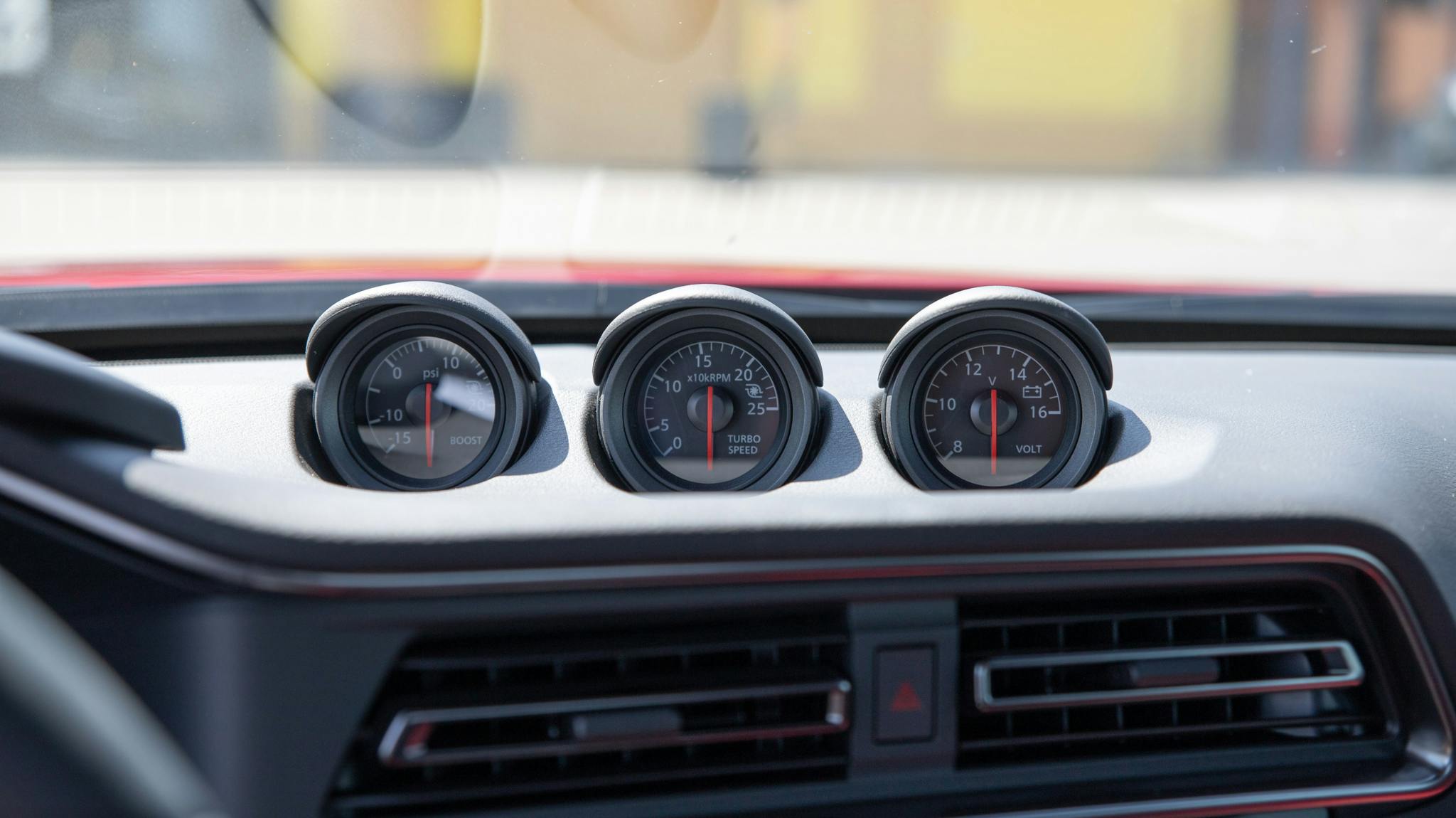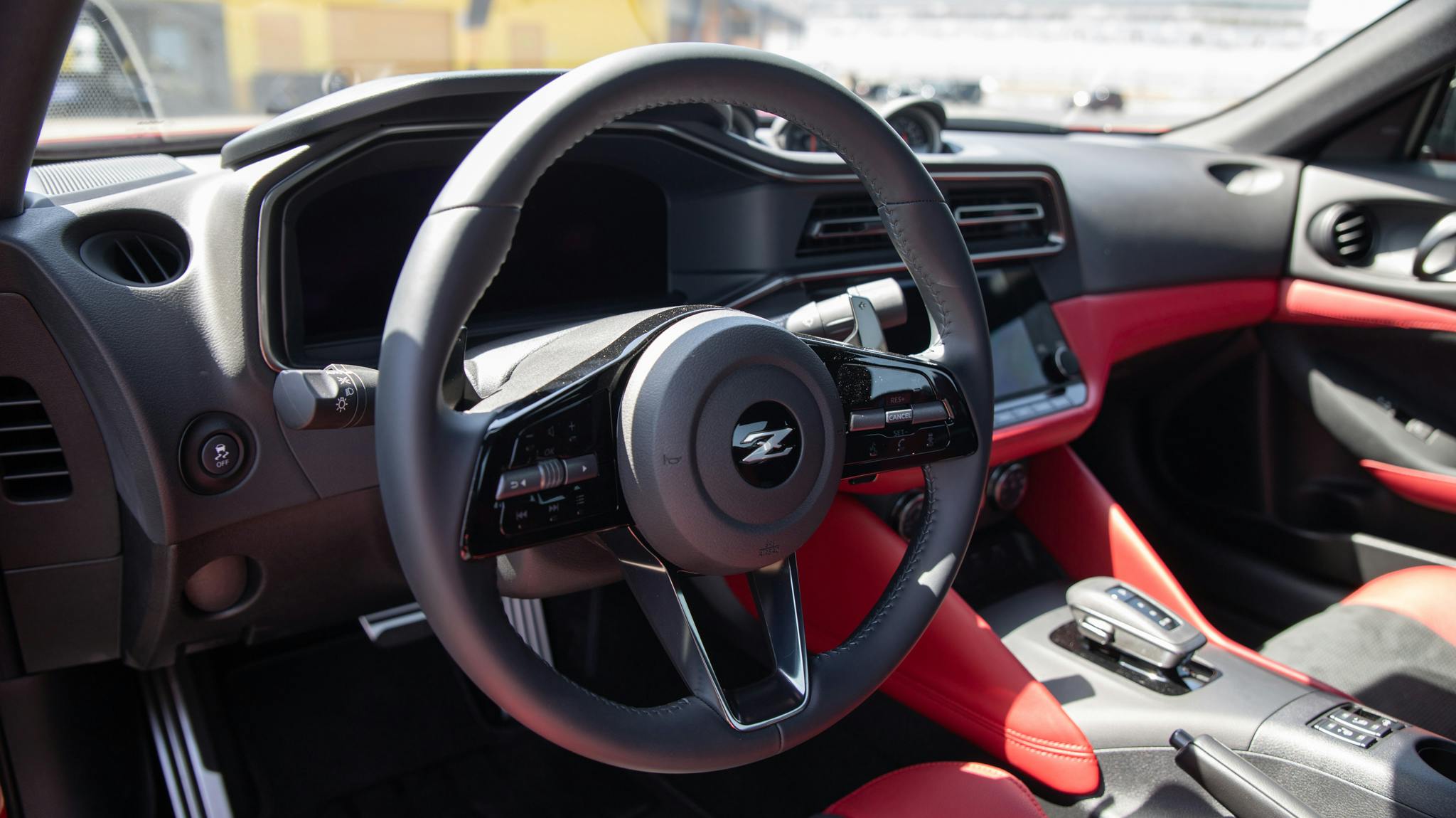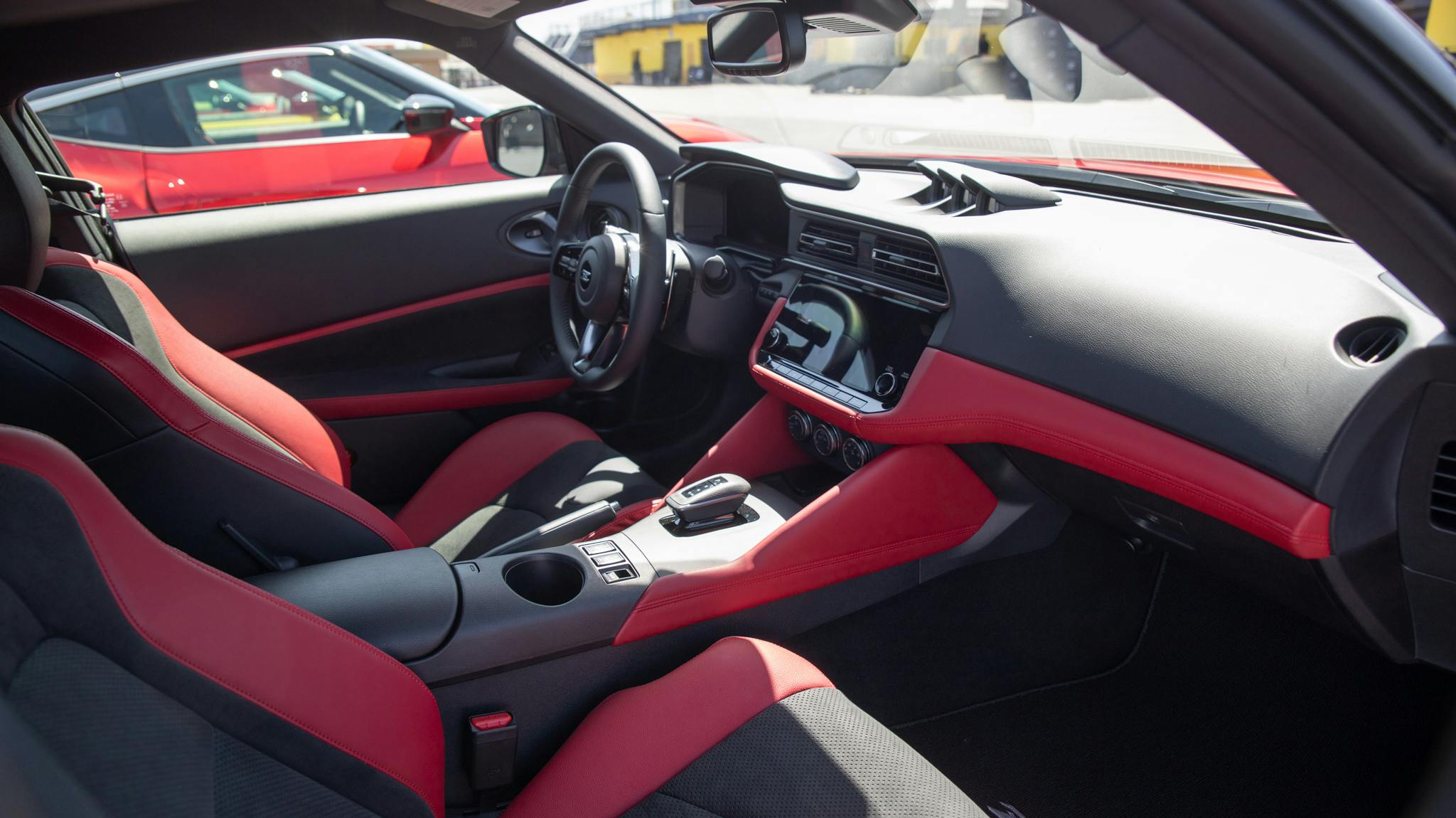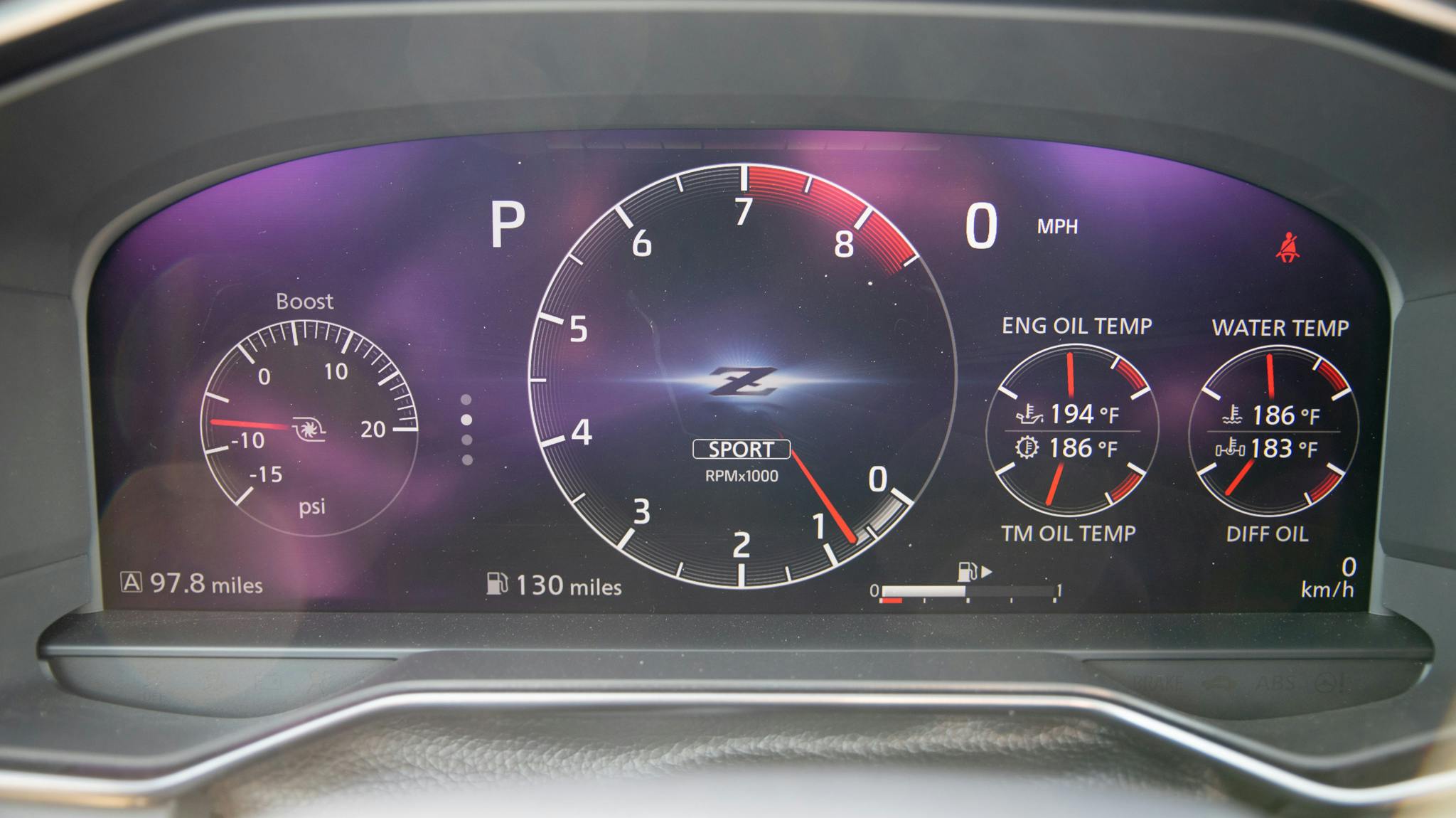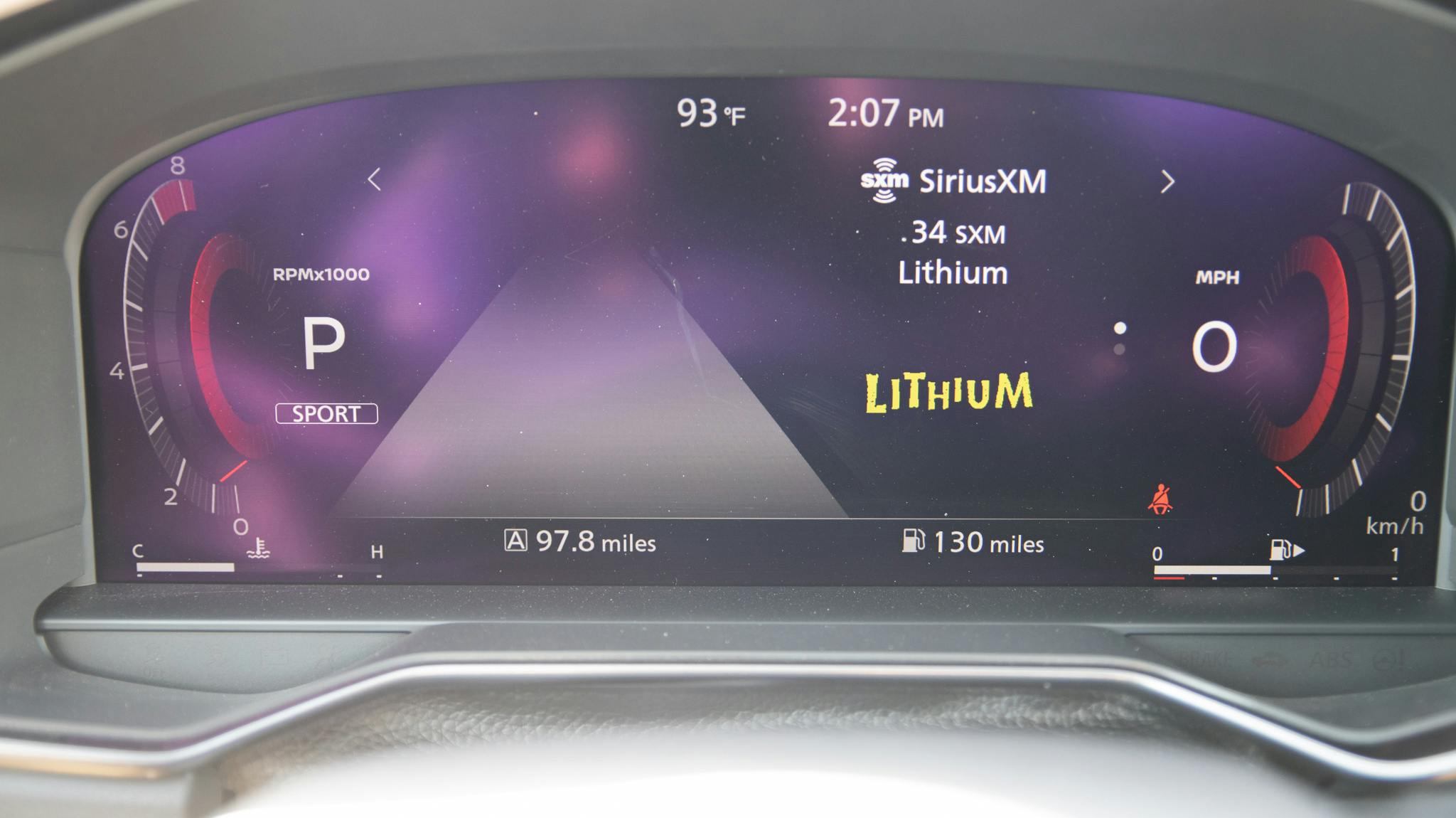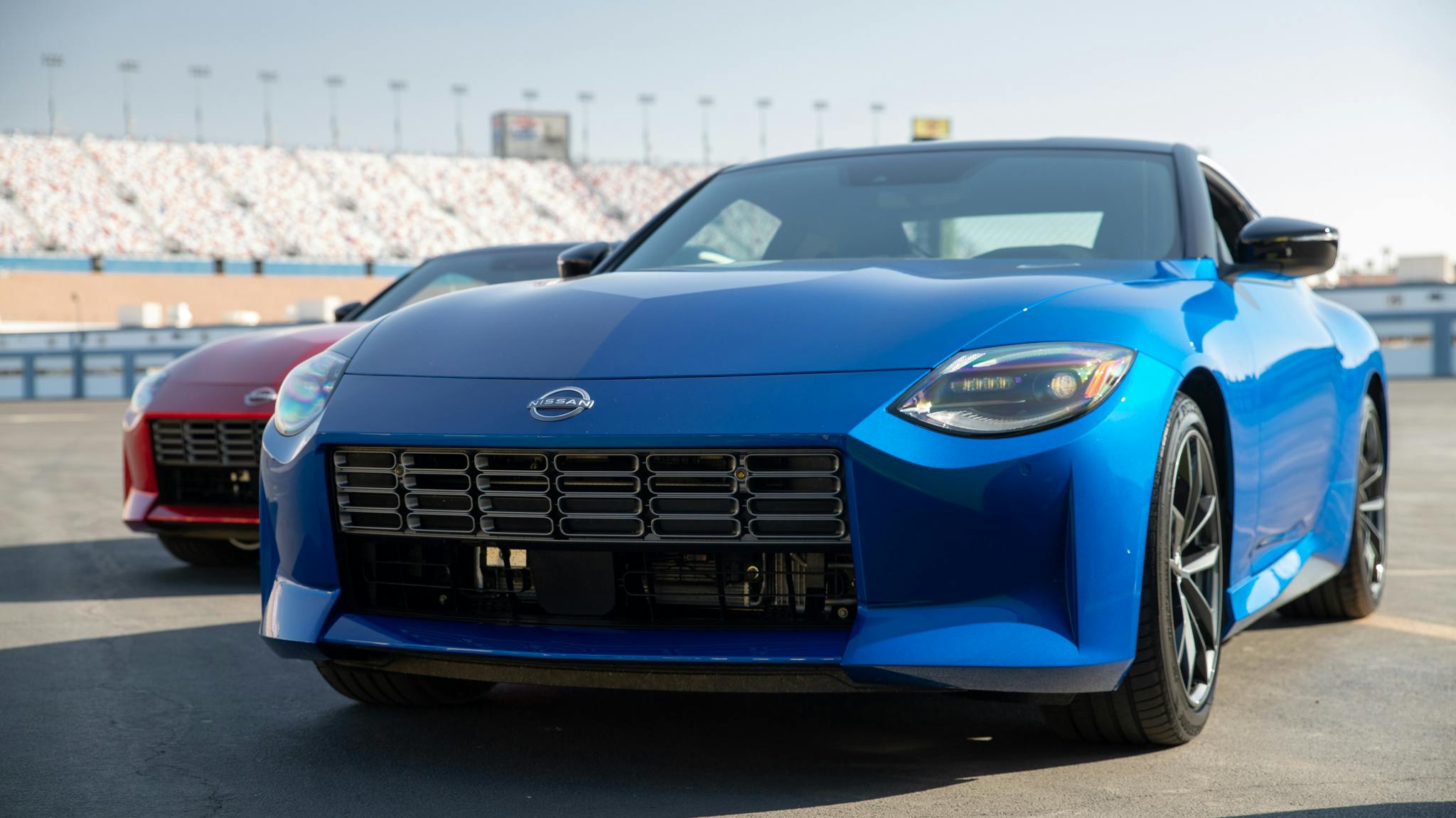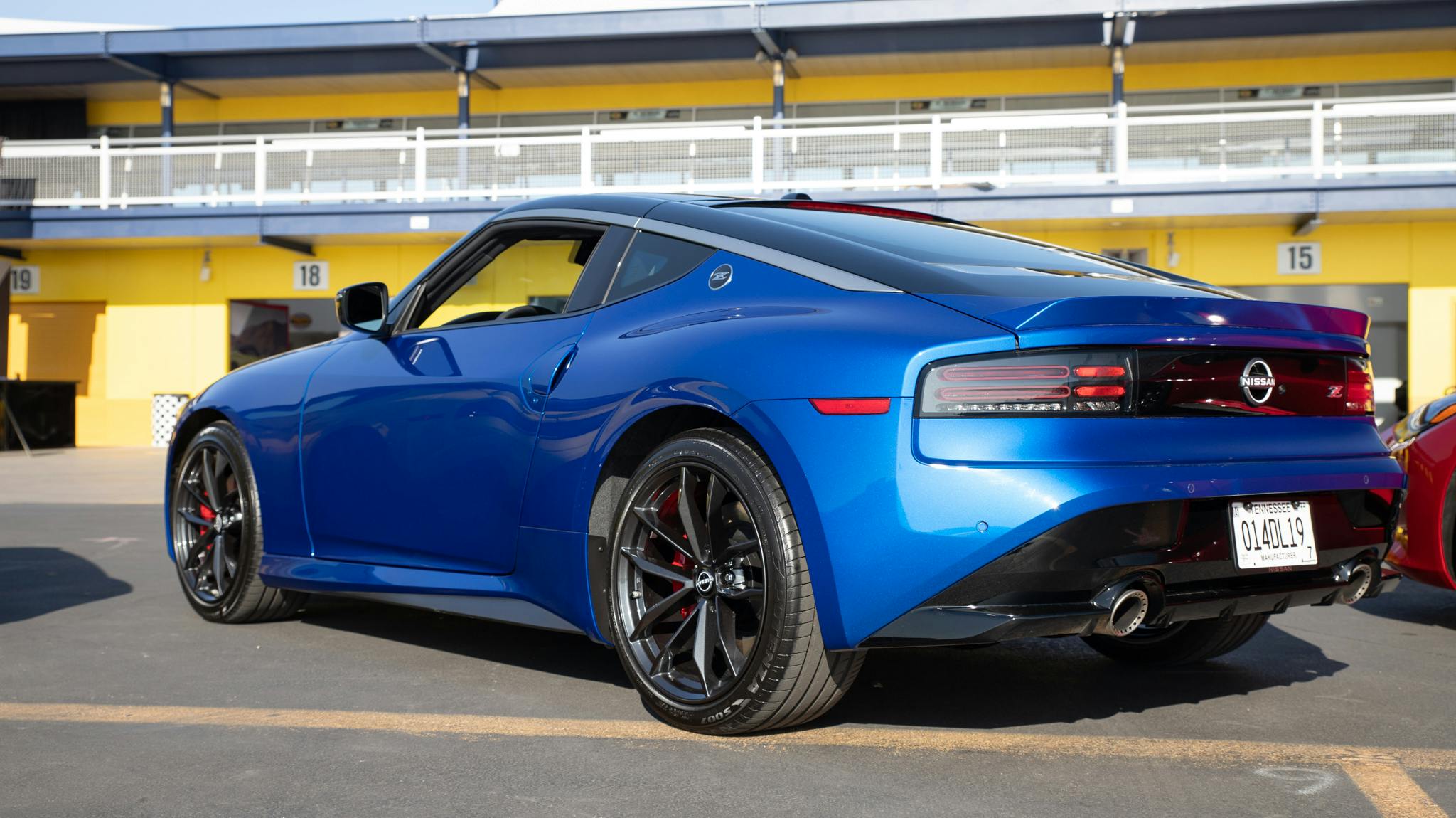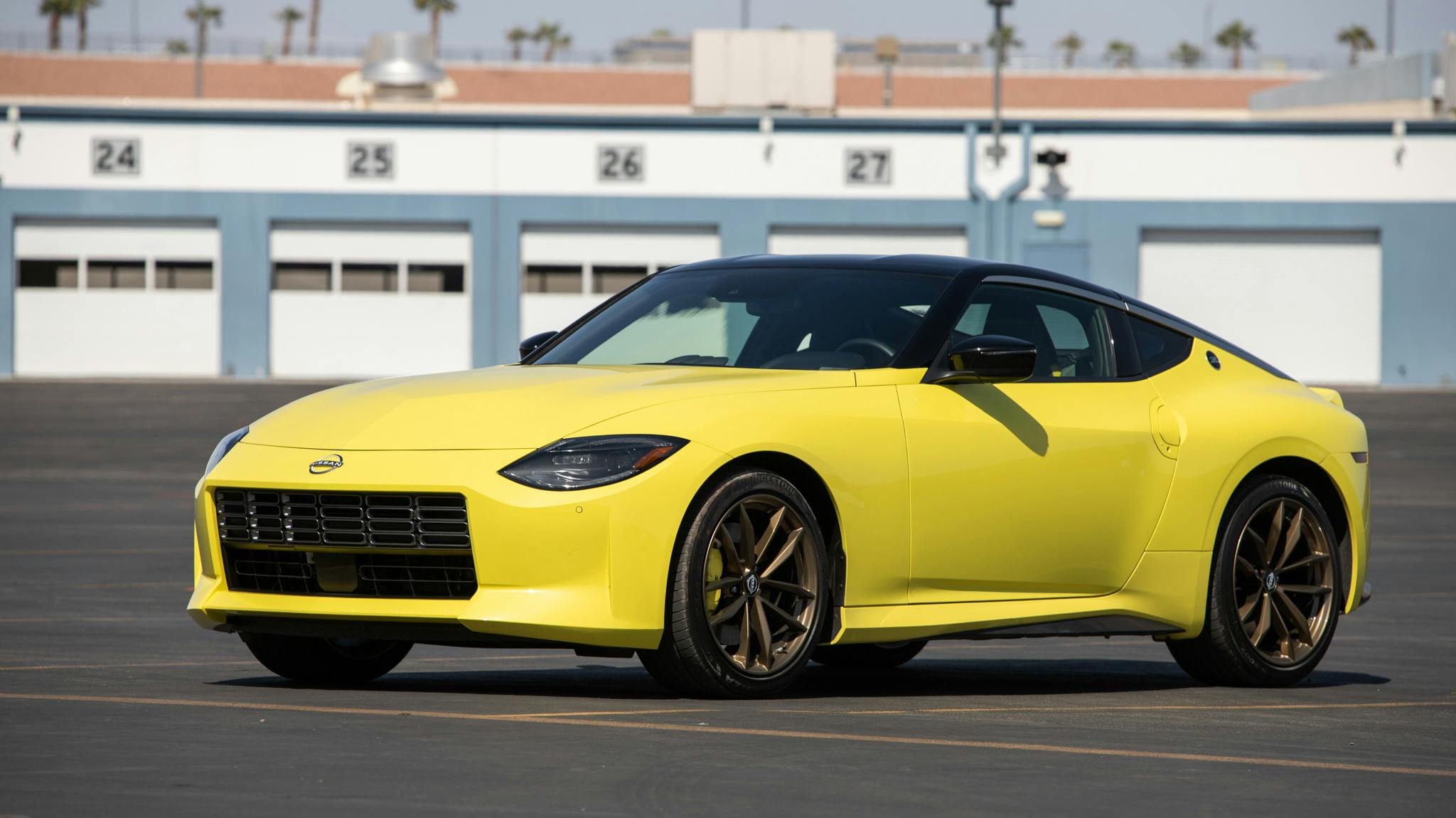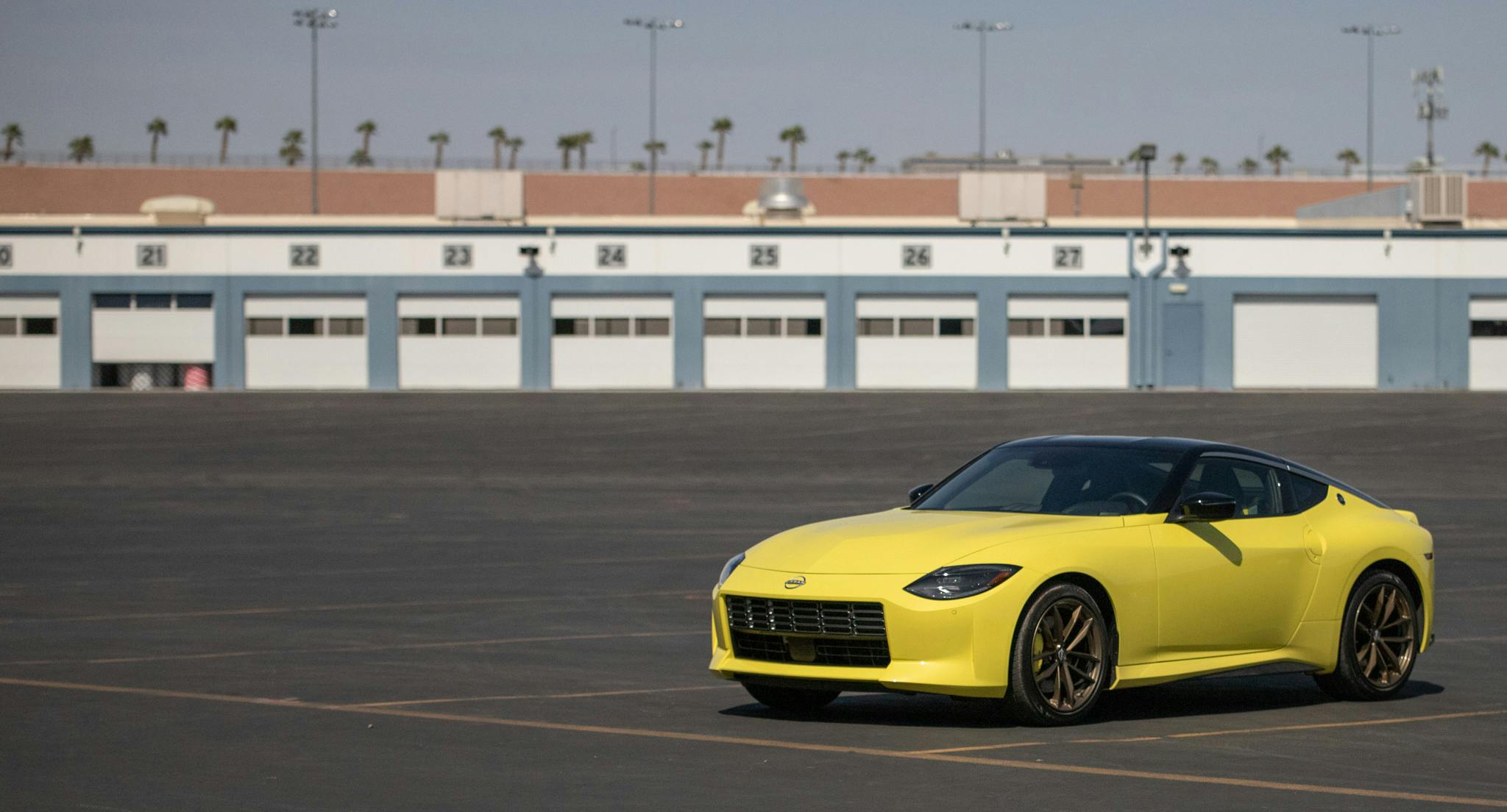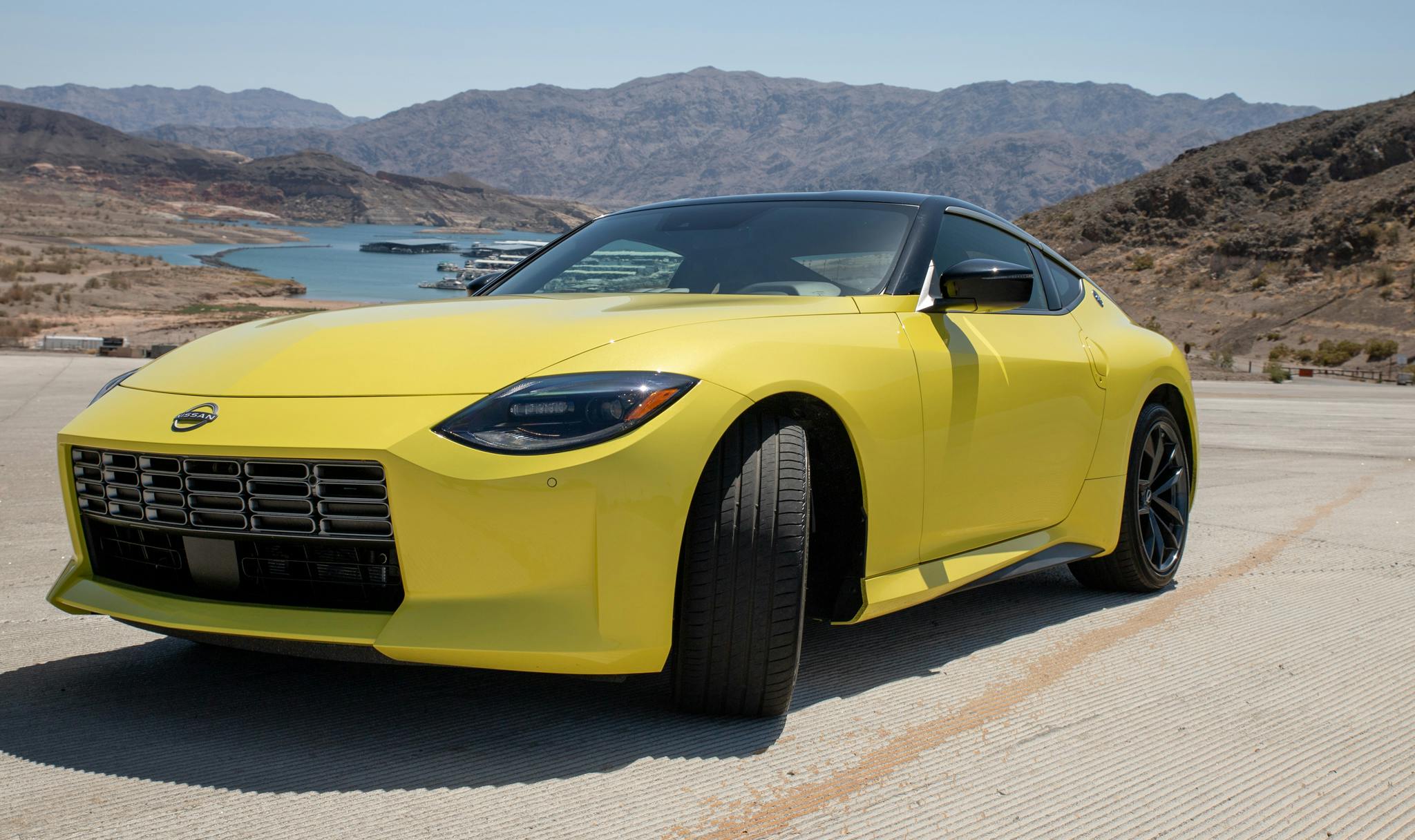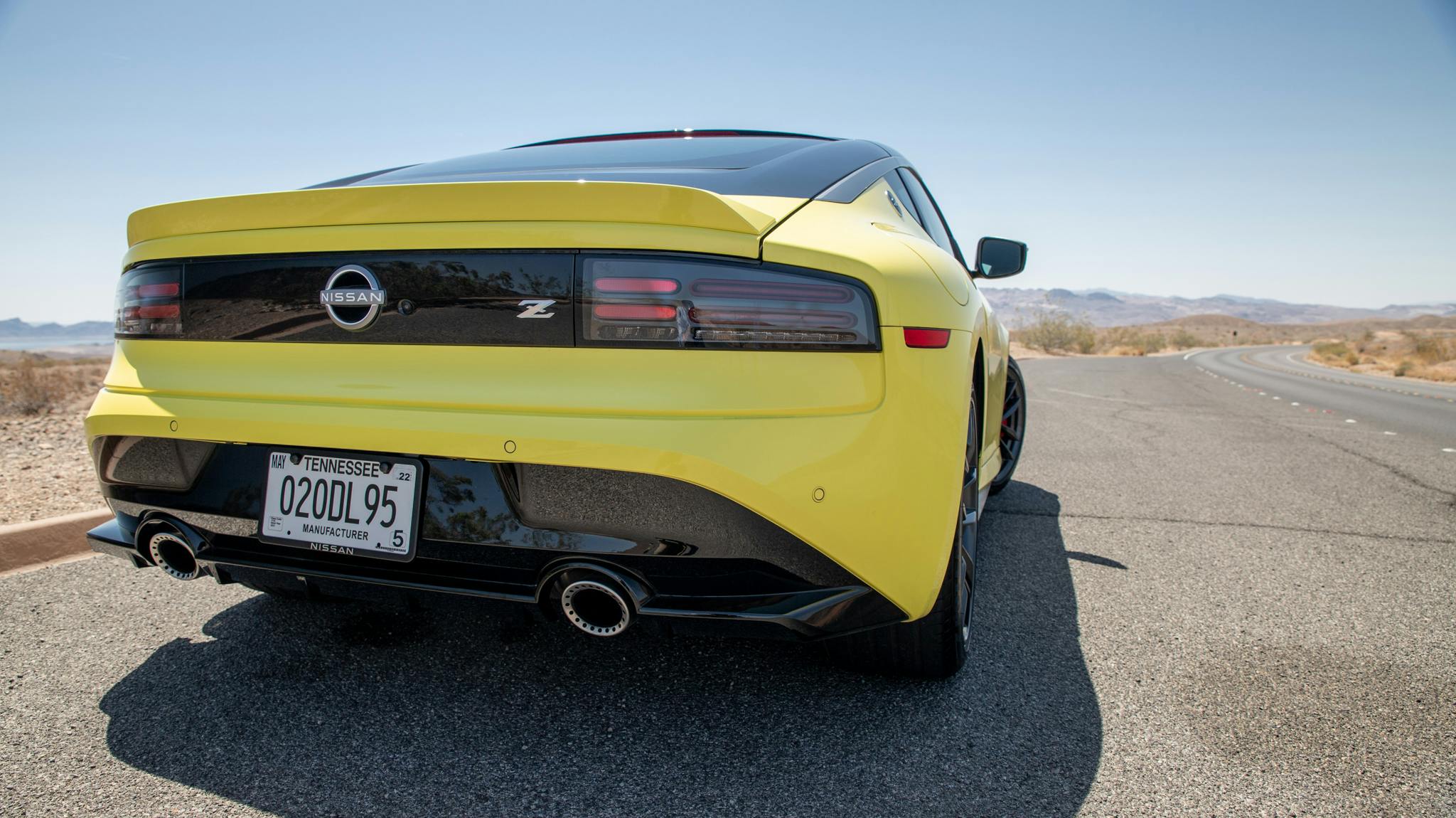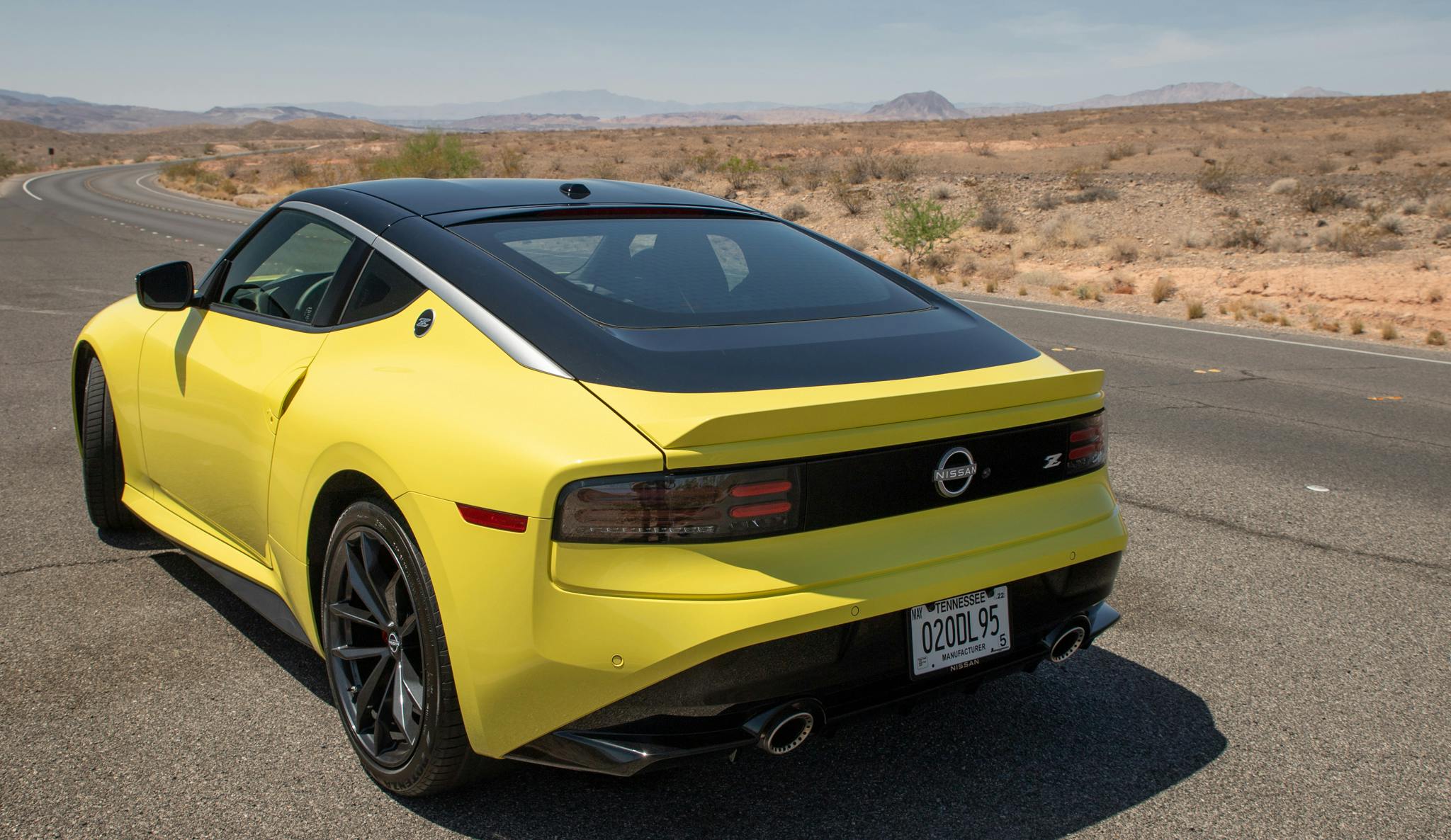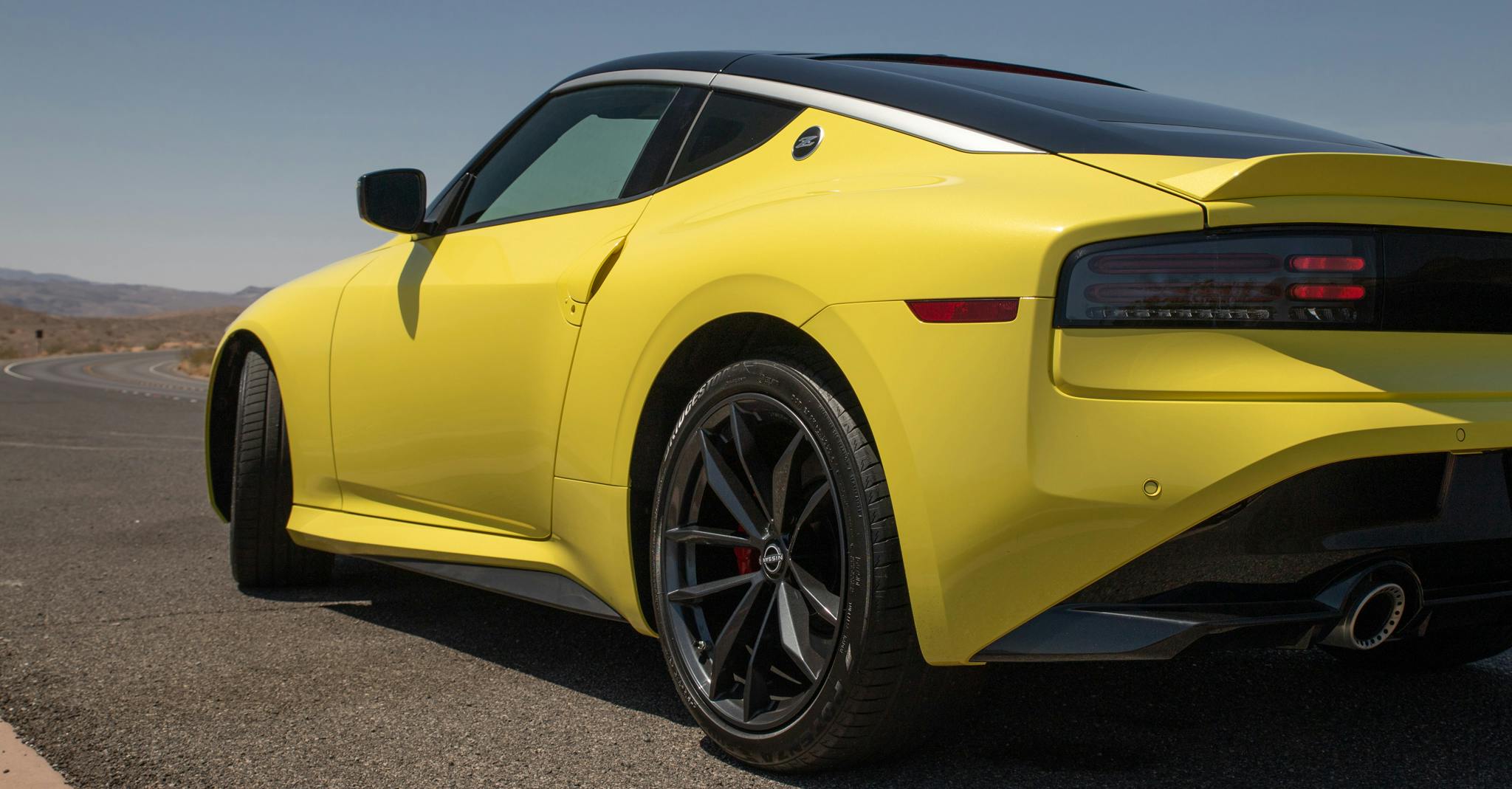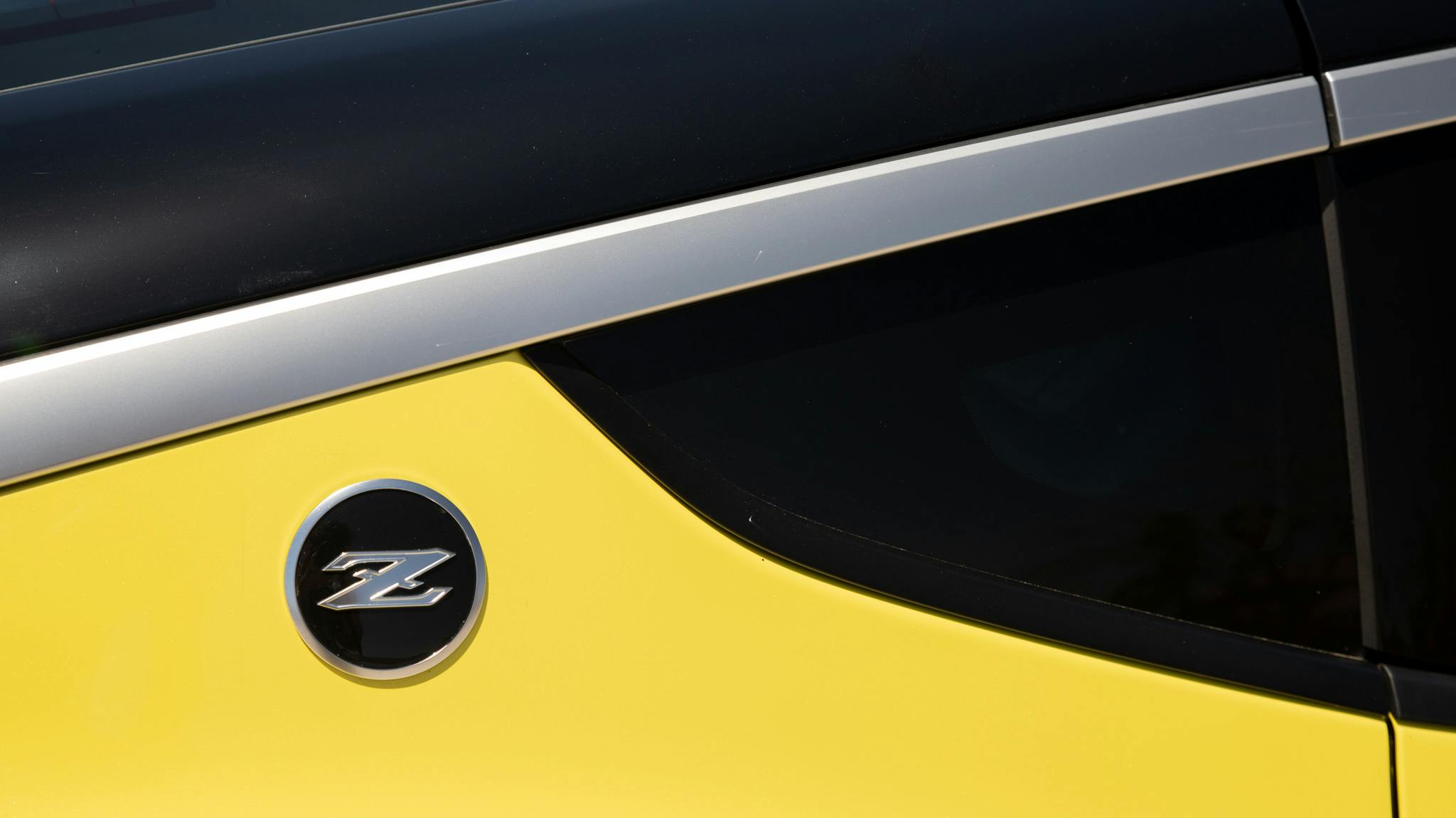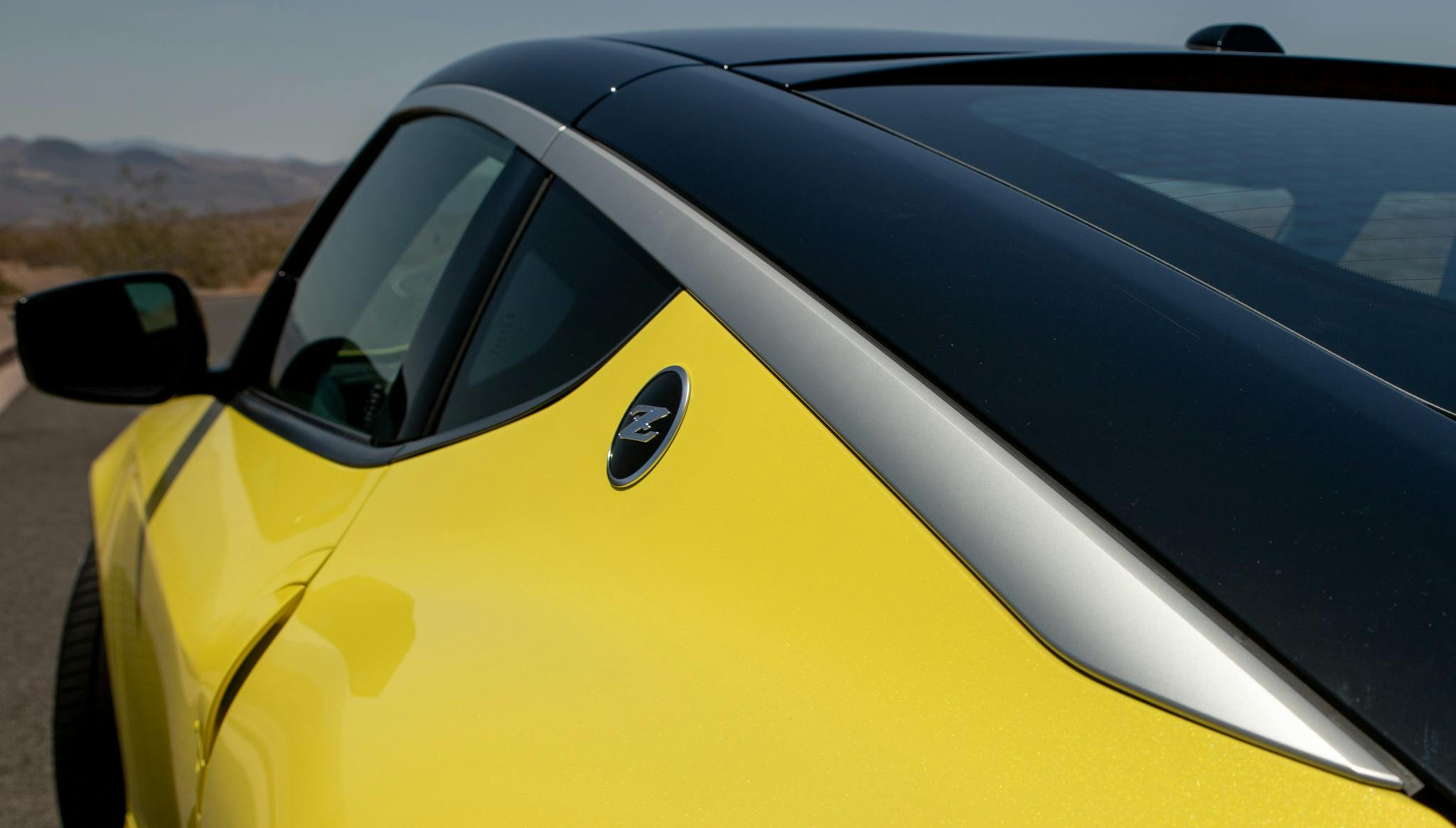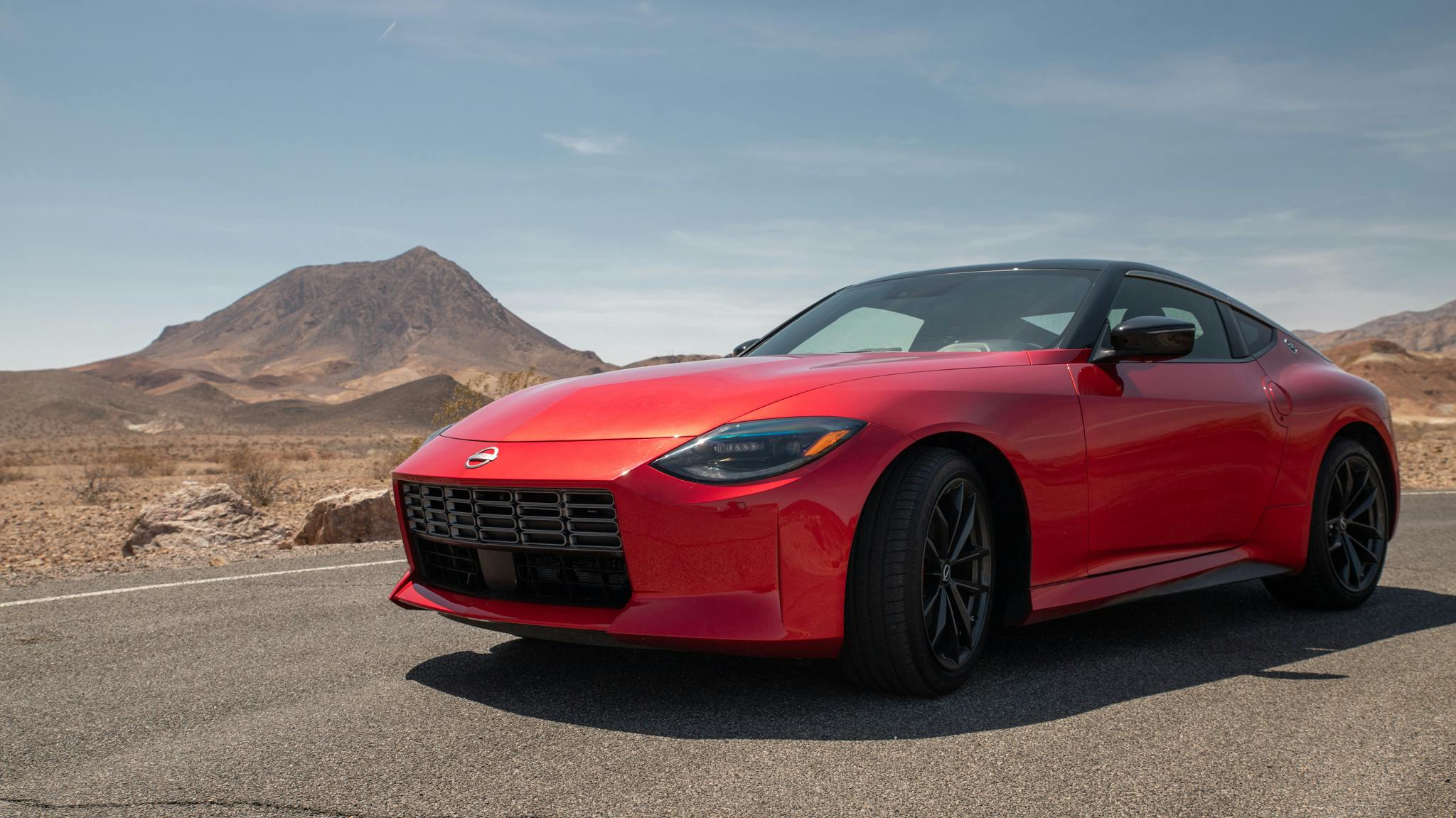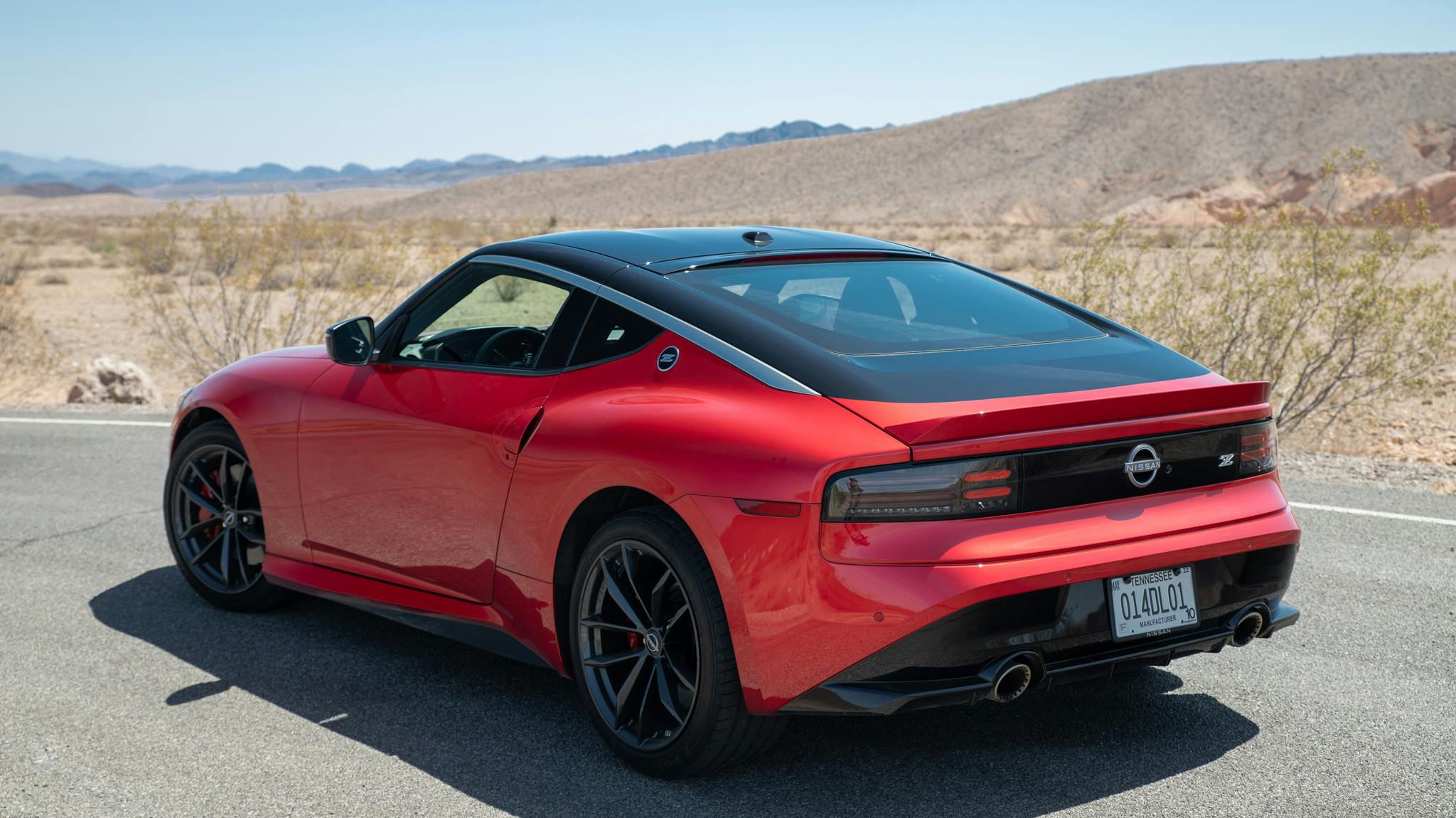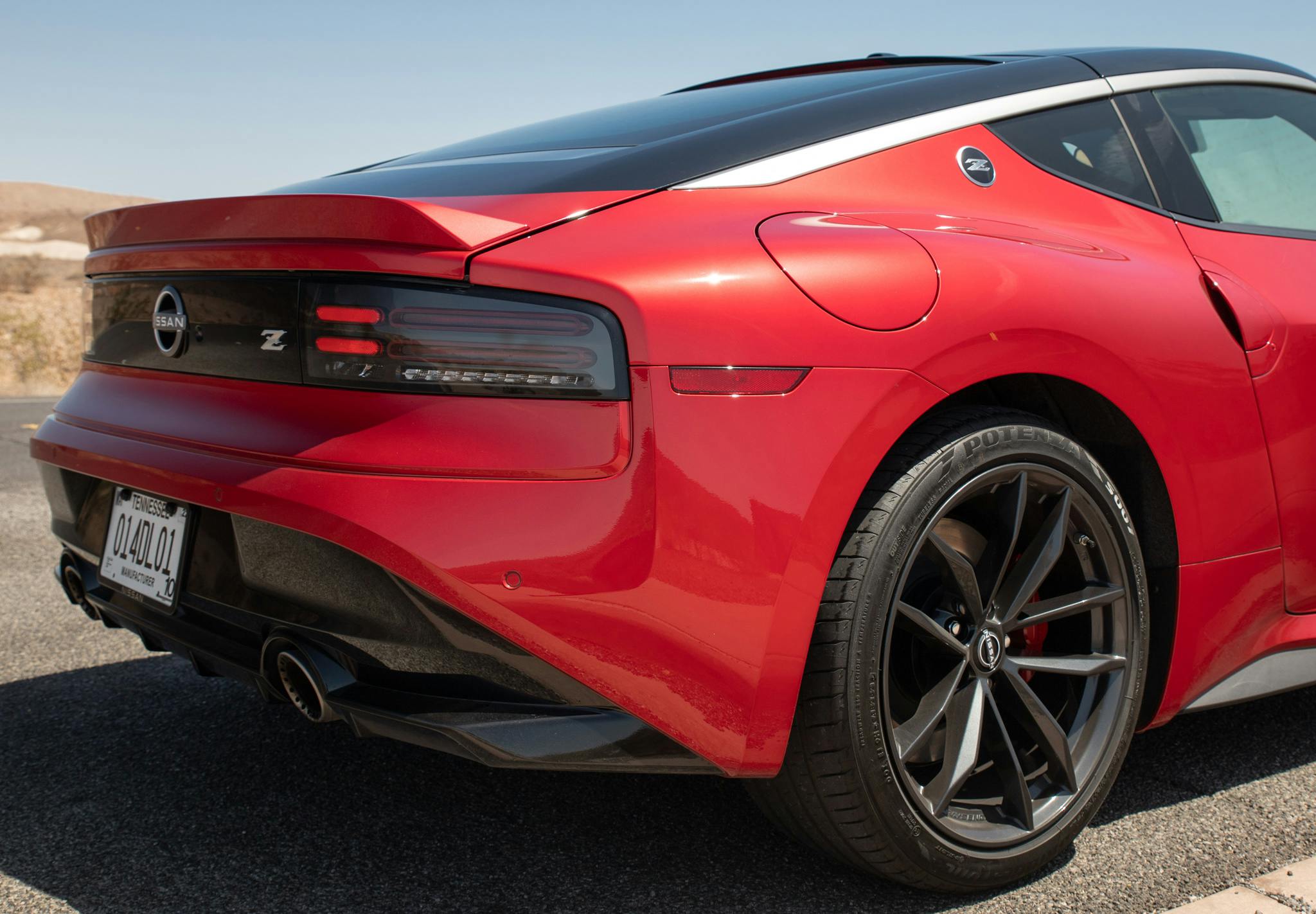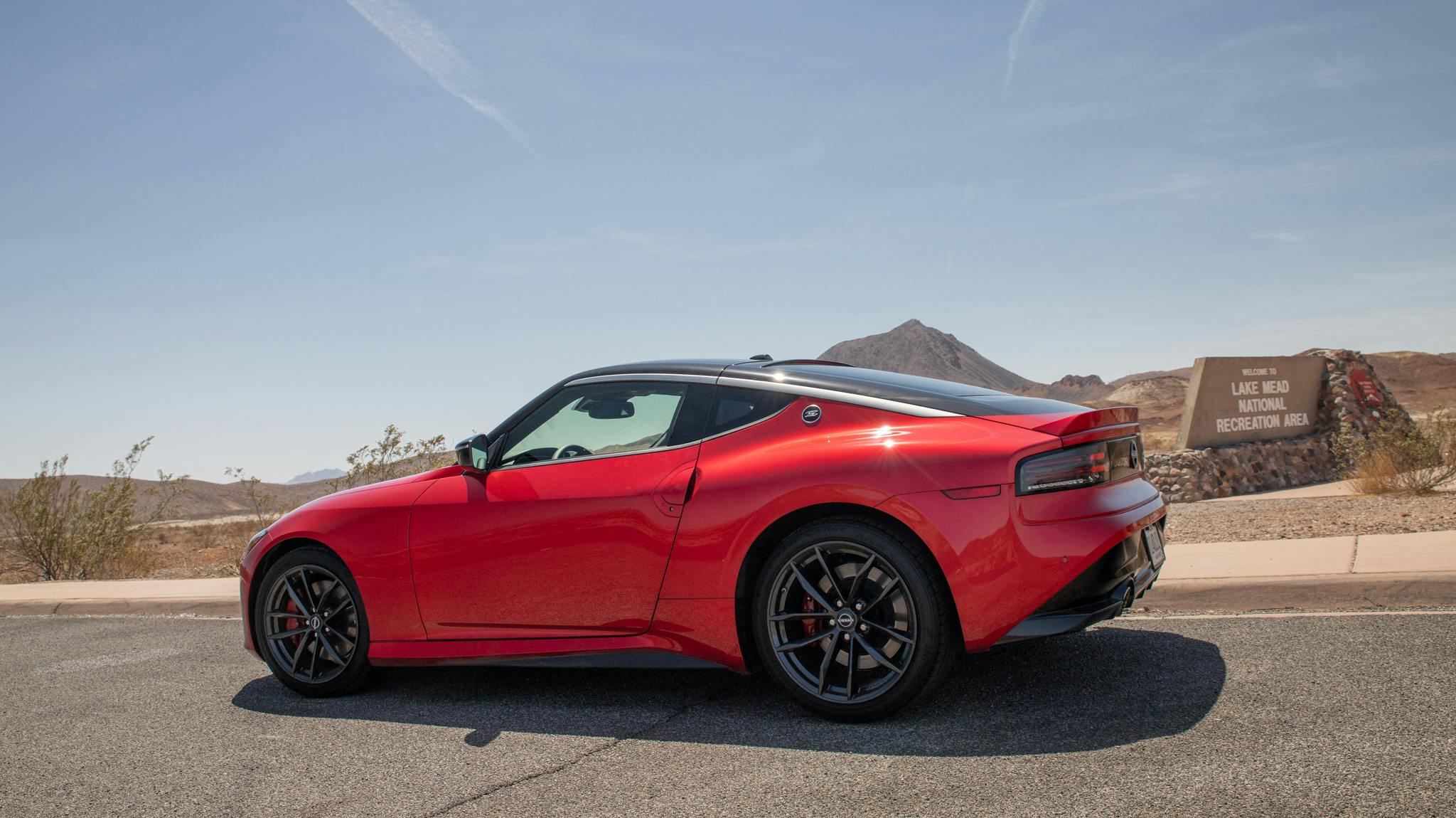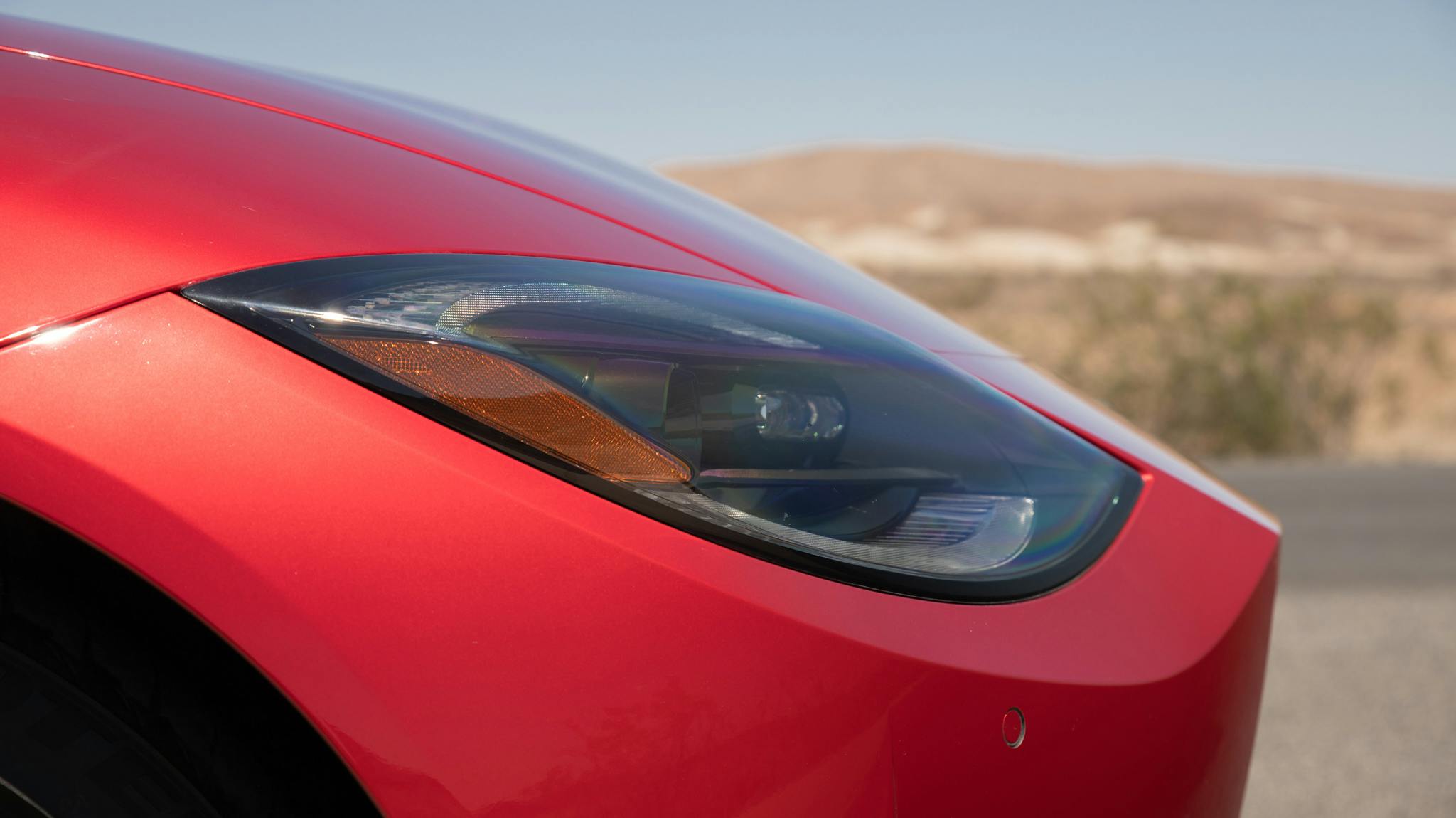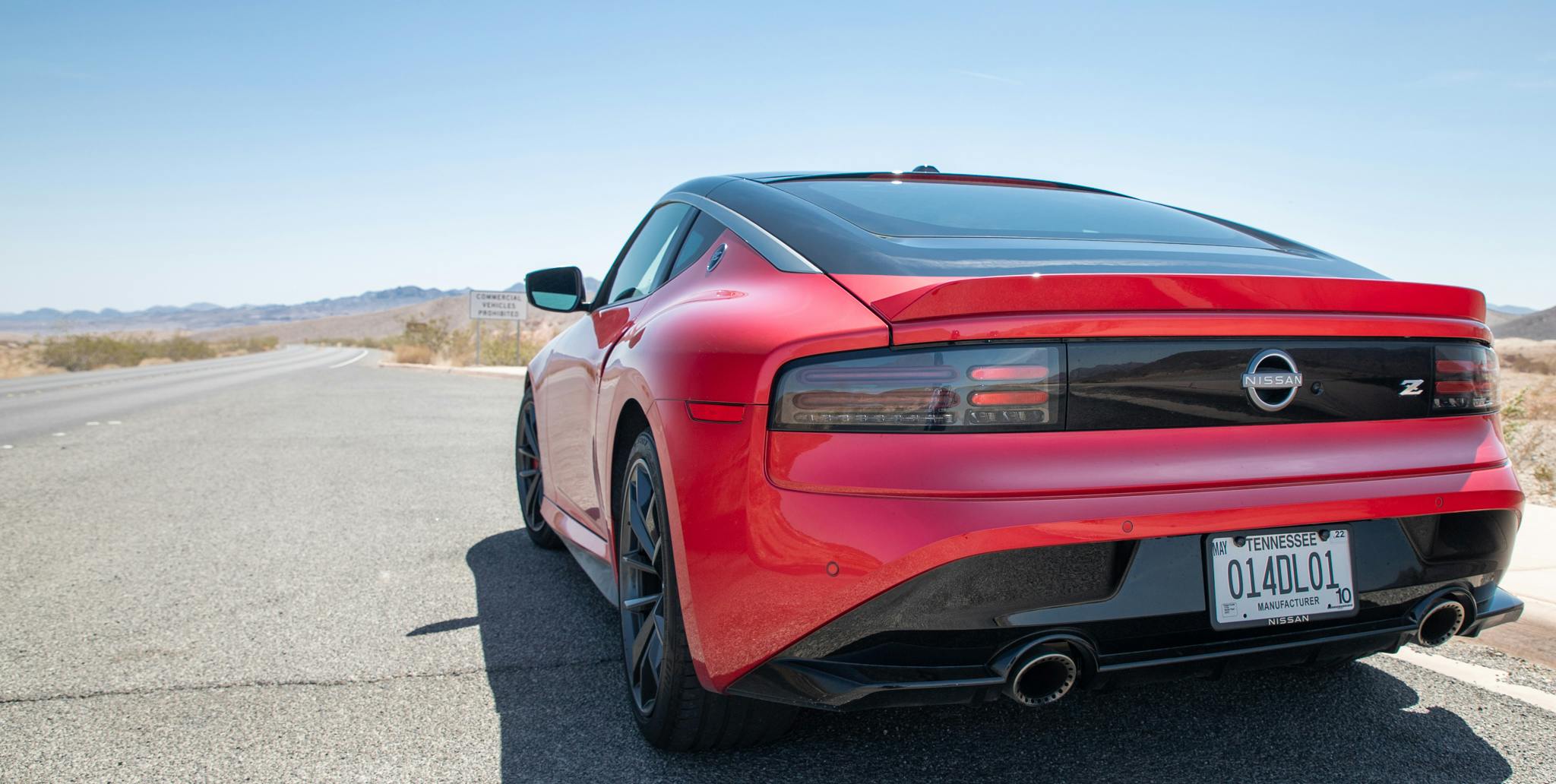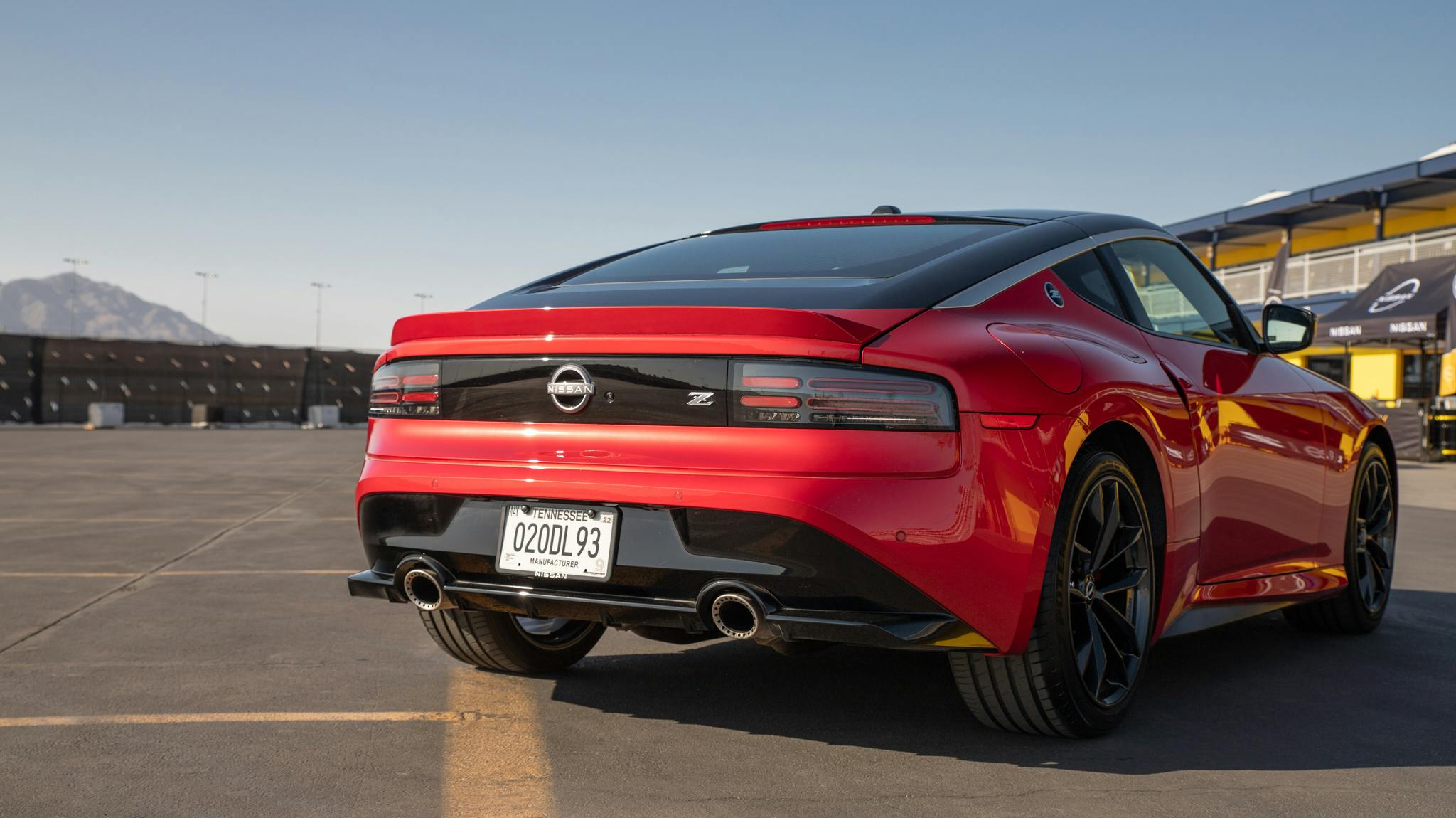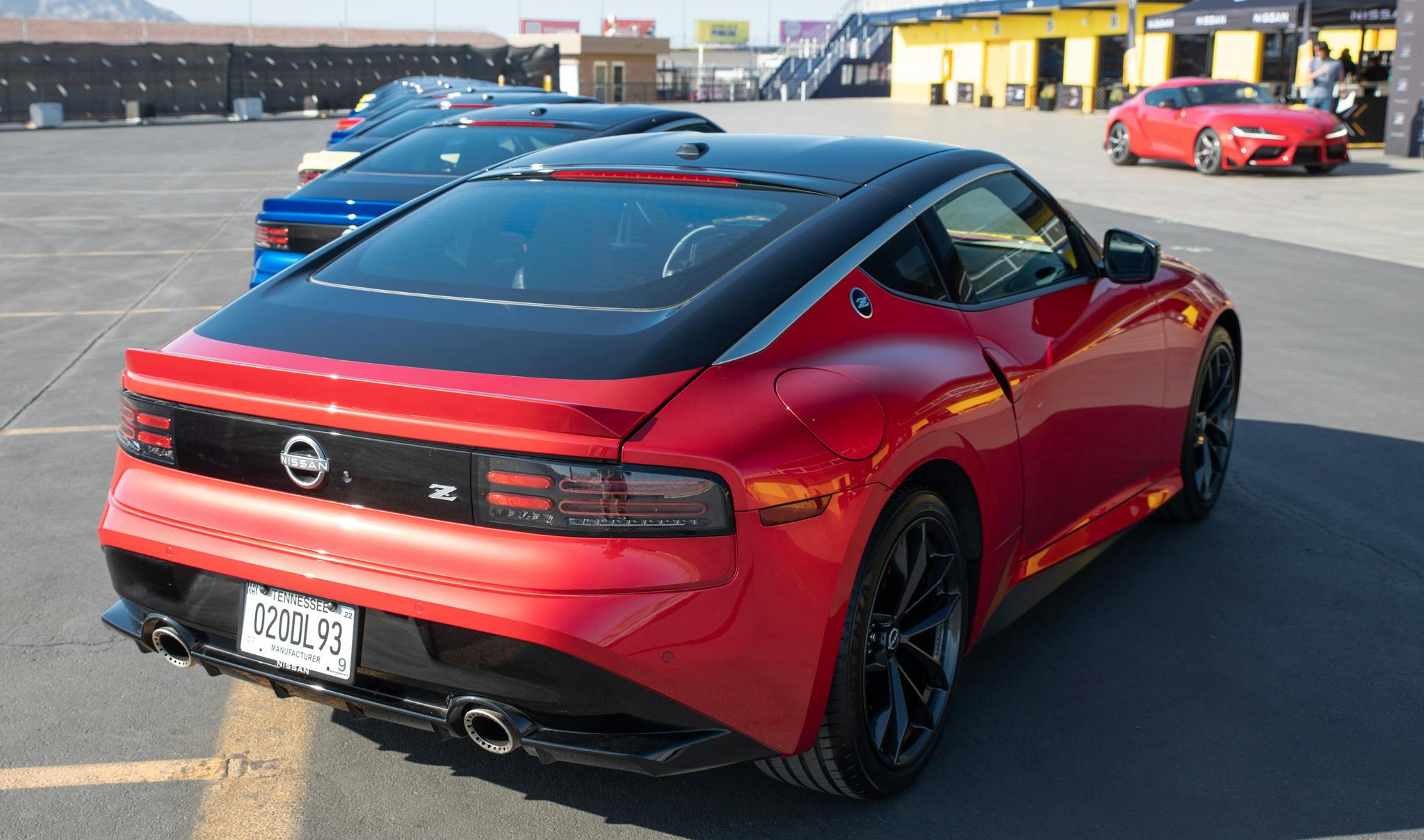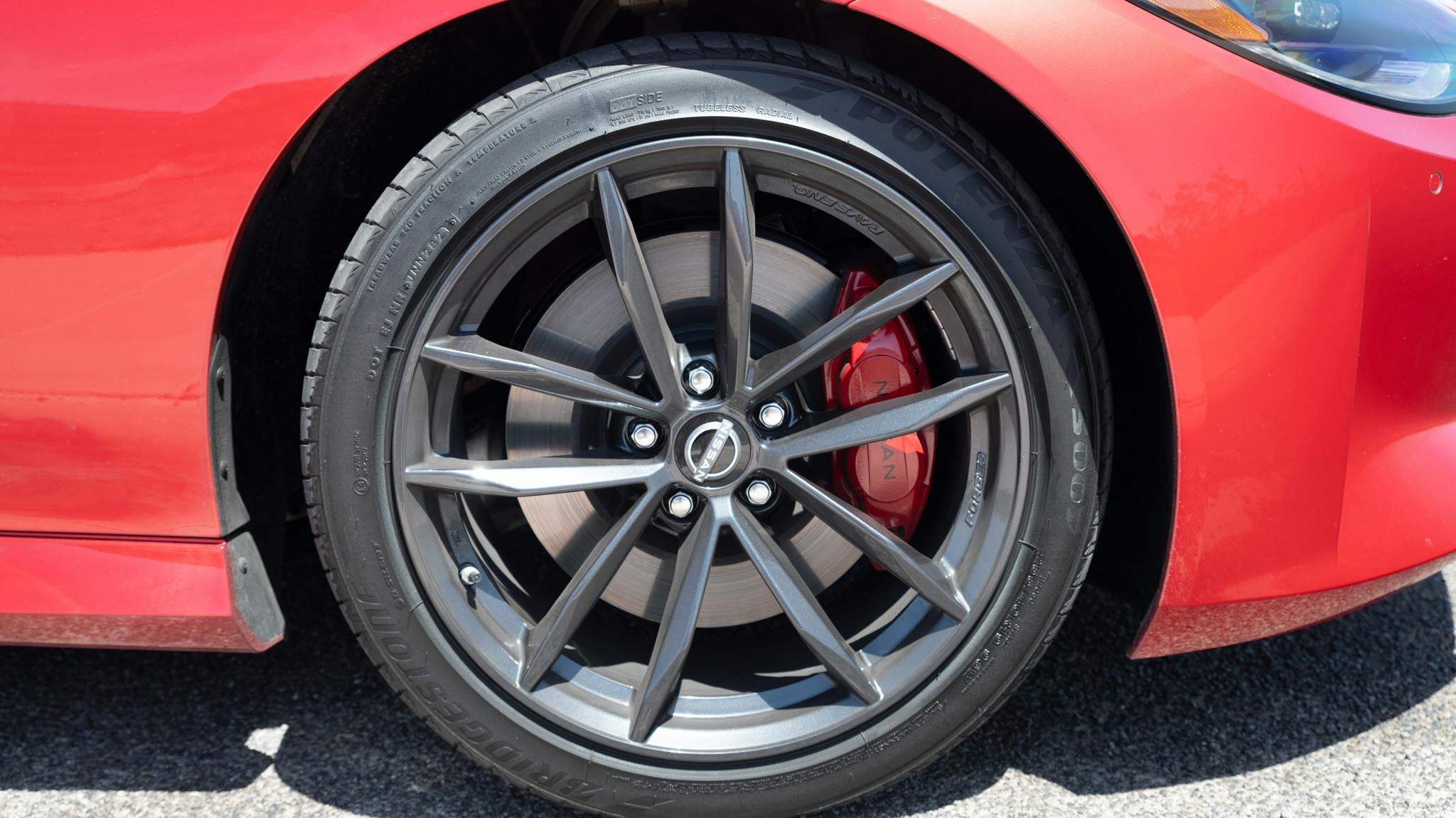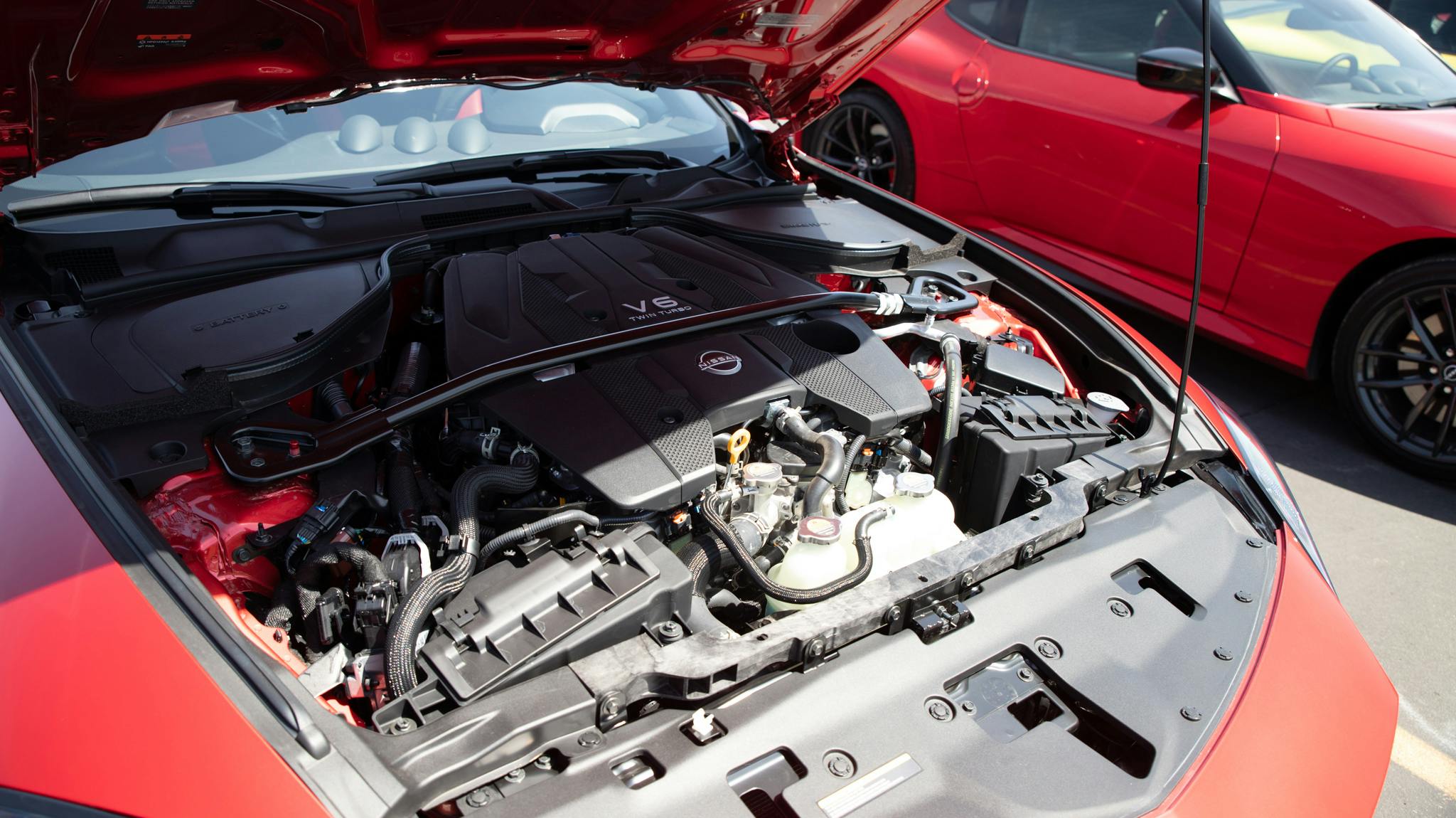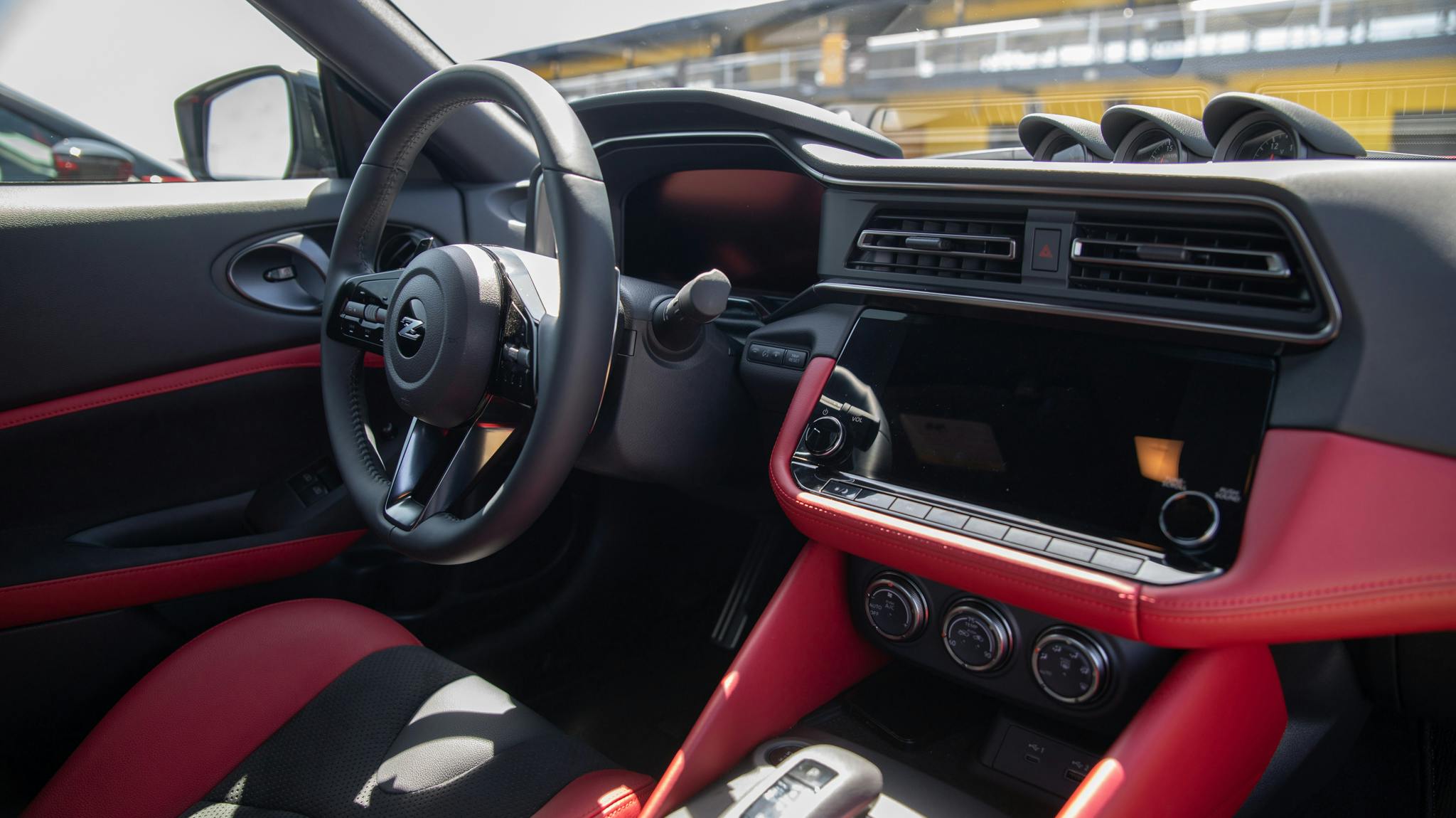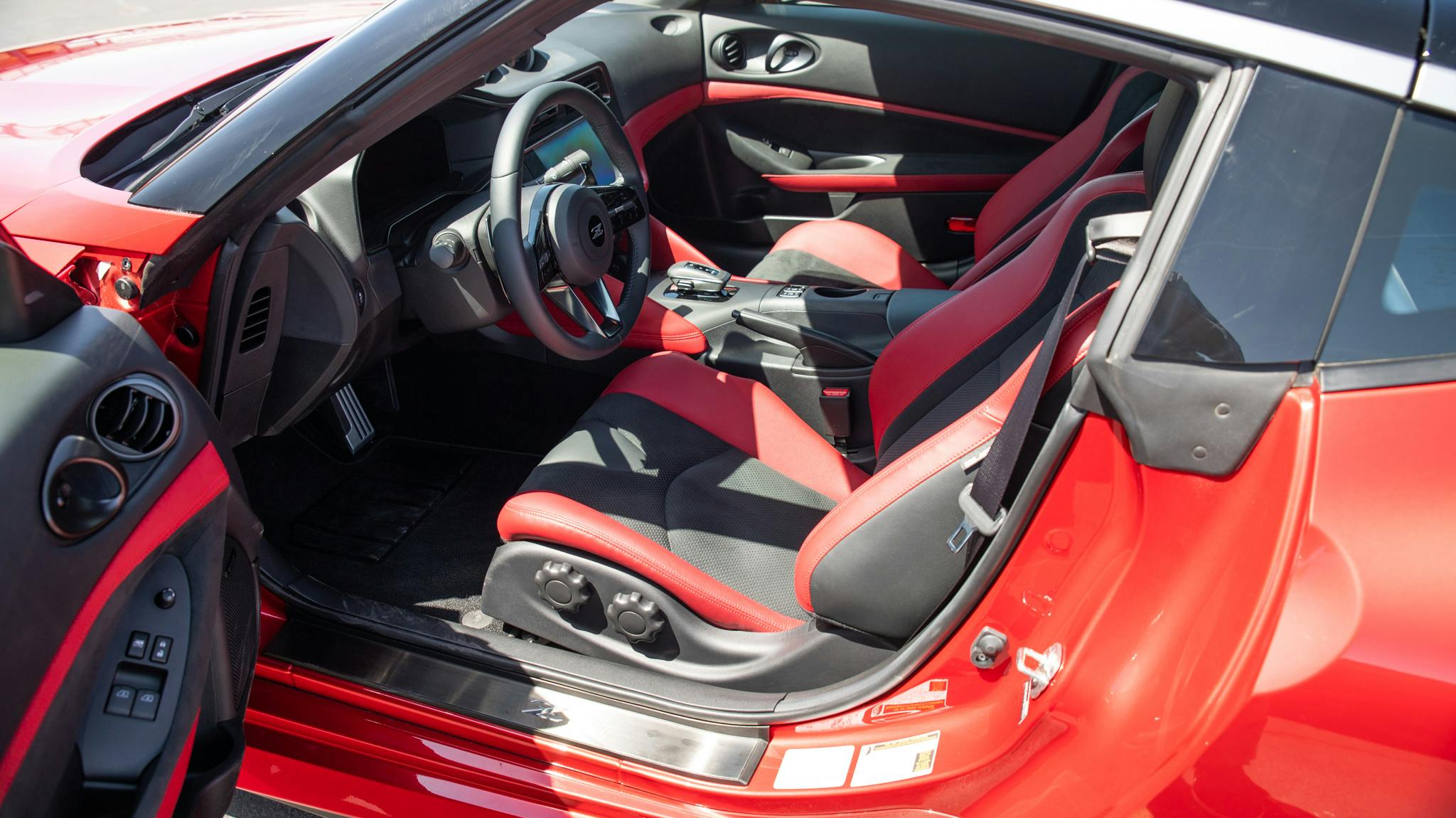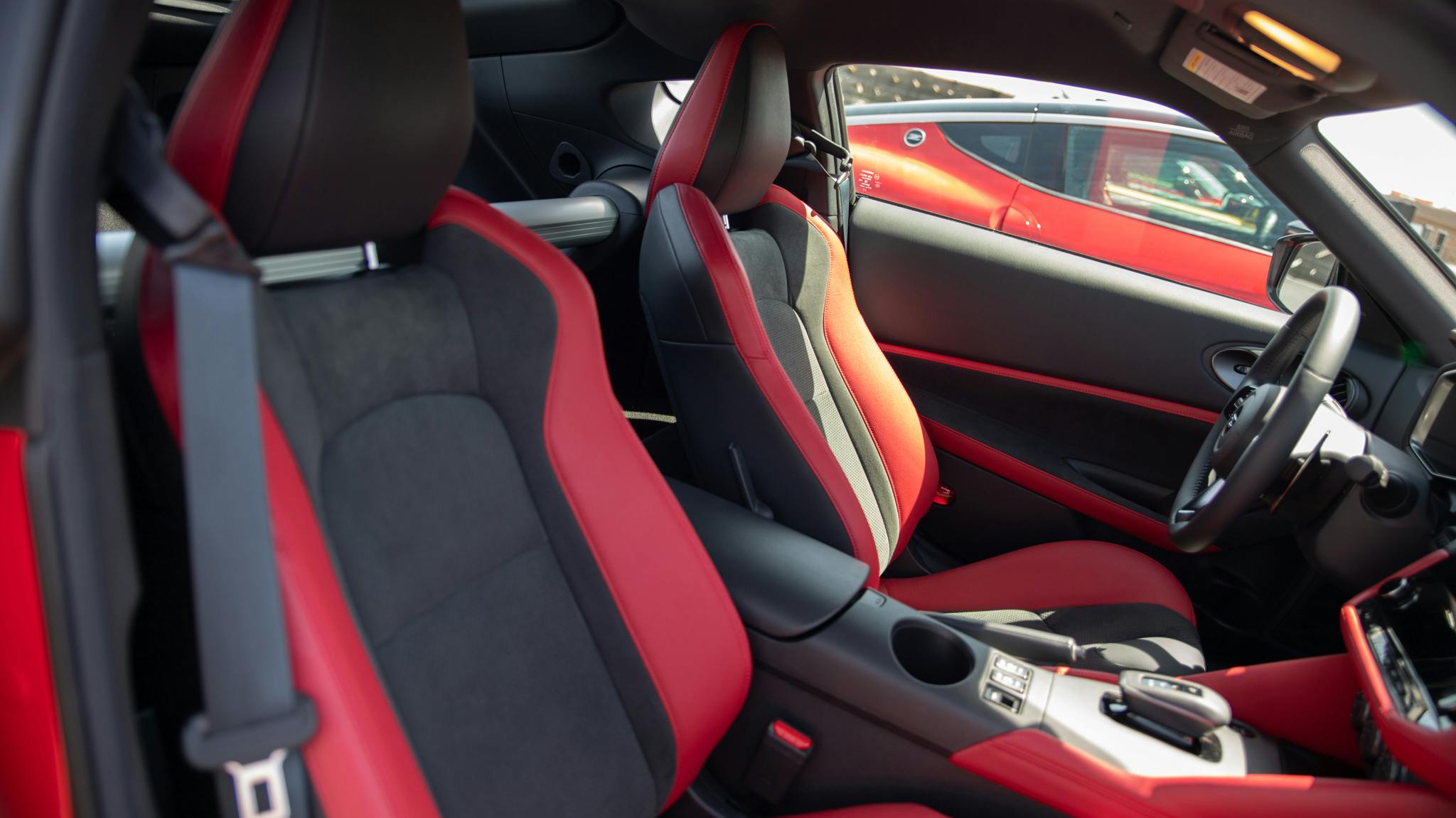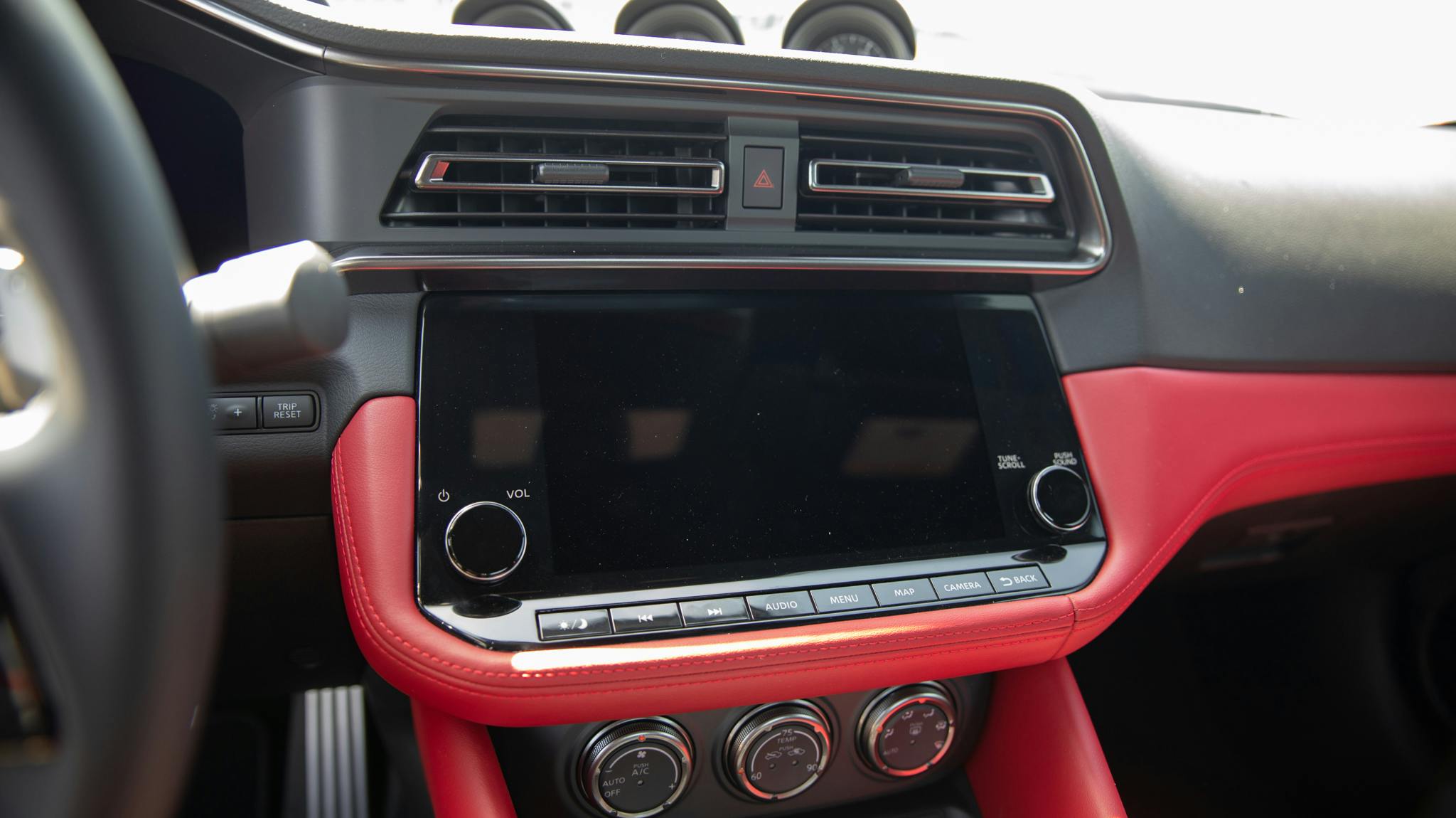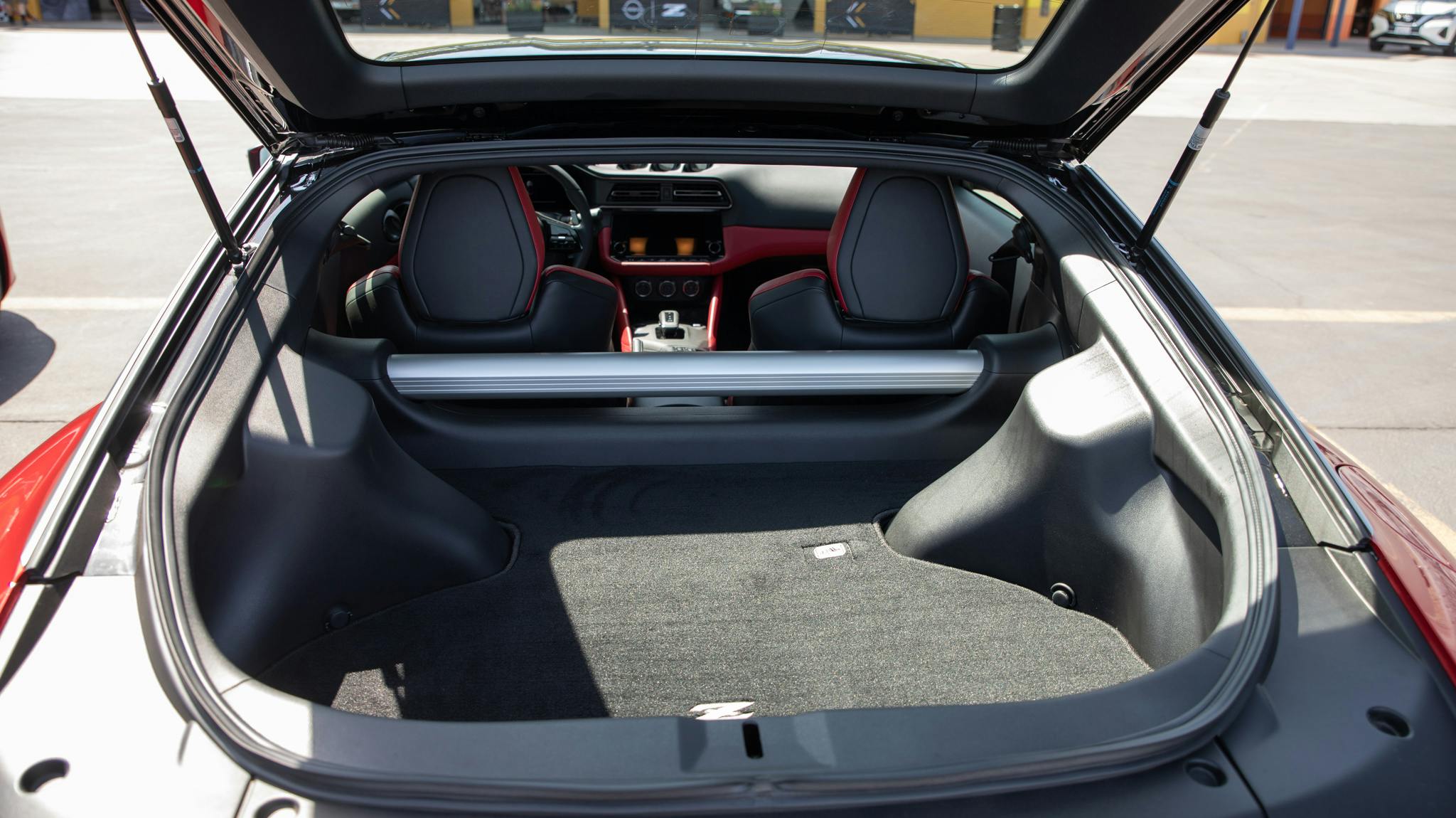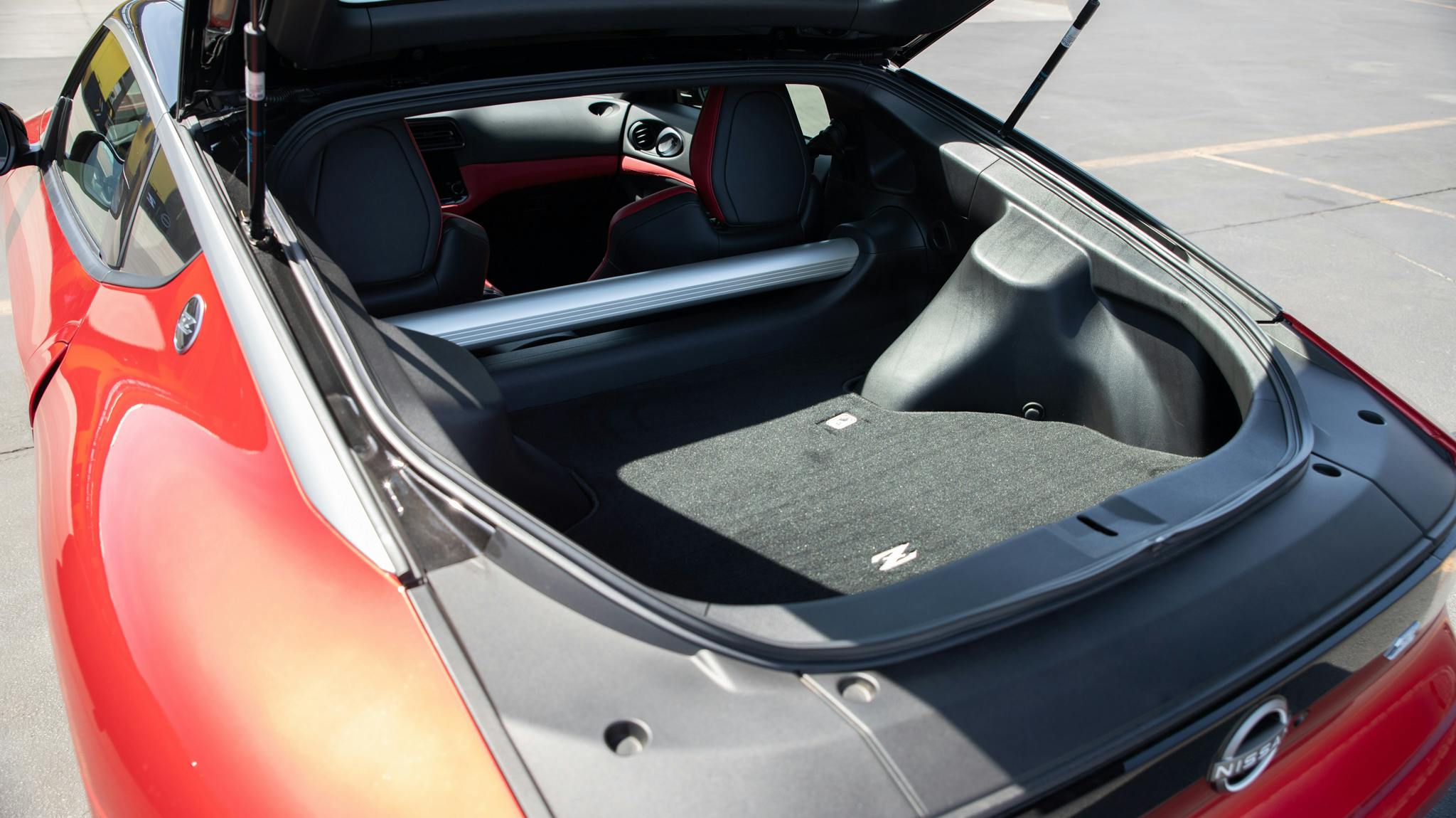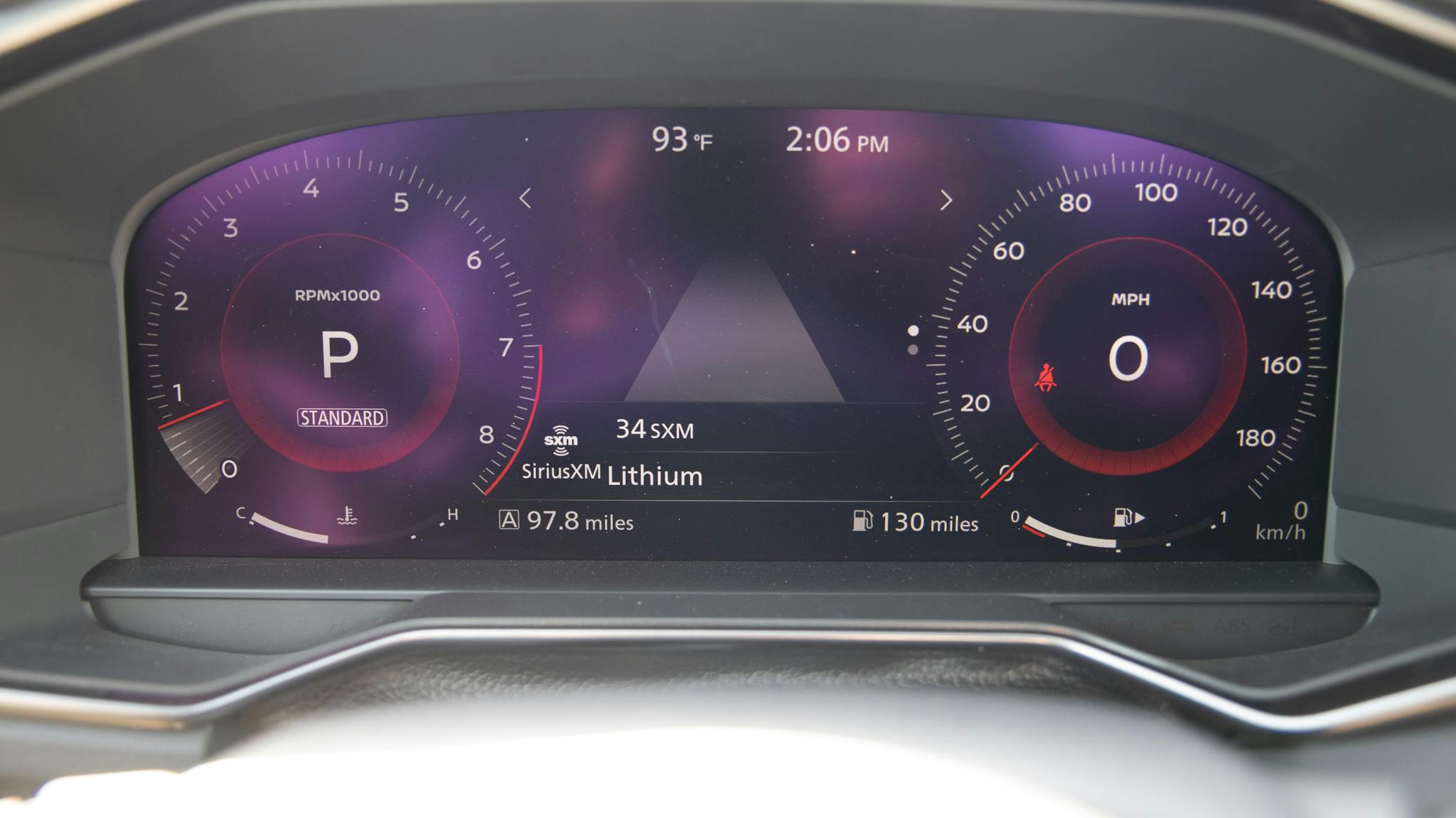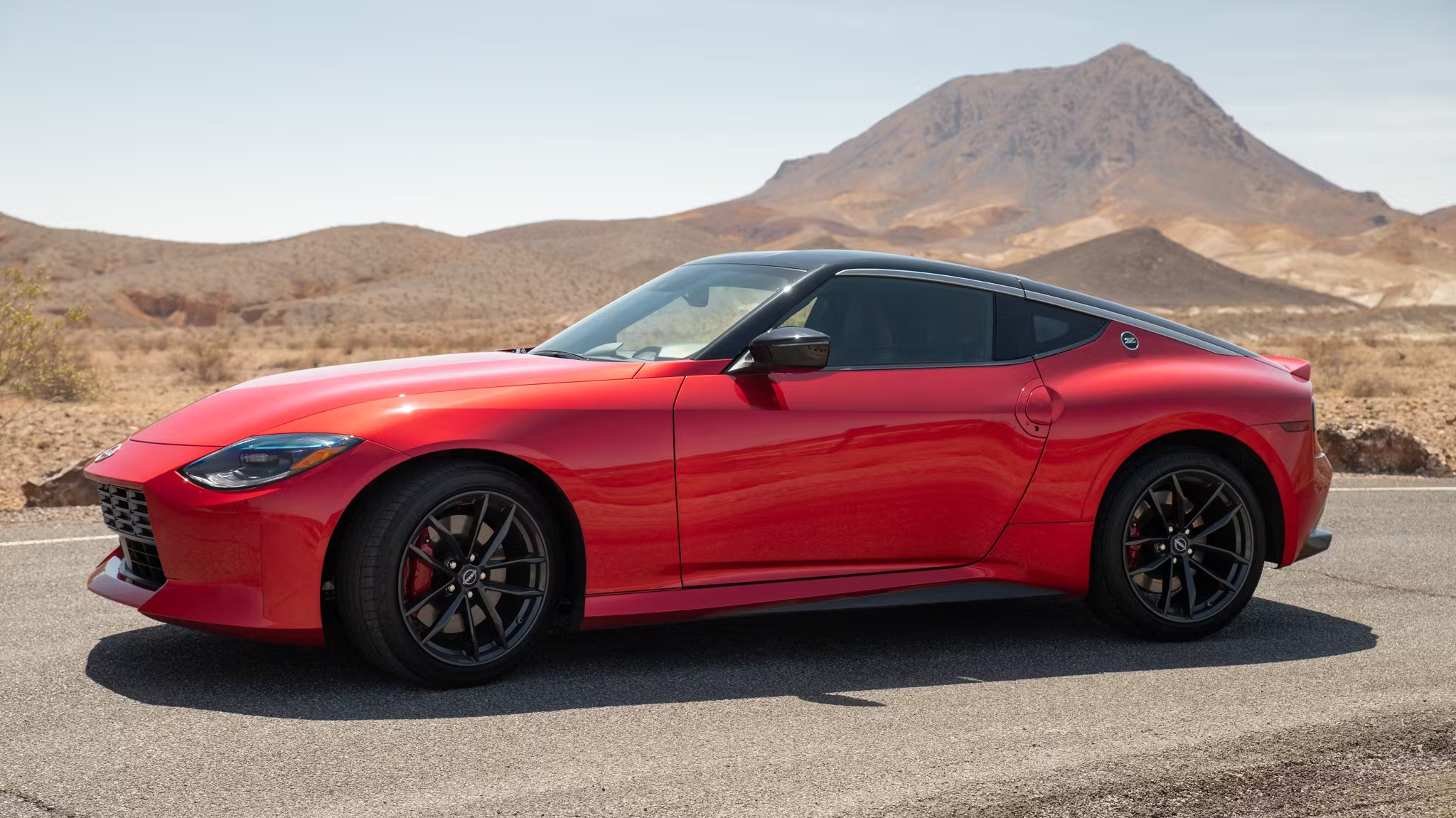Media | Articles
First Look Review: 2023 Nissan Z
Once you become an icon, you can choose to go by a shorter name. A-Rod, Bruce, The King, LeBron. Fame bestows brevity. It can work with cars, too, as Nissan has demonstrated with the new Z.
No numbers. Just “Z.”
Nissan’s sports car has, no question, earned this status. Over a 52-year run, it has largely held to a simple and compelling formula: attractive sports-car design, high performance, and an attainable price. Most Z iterations have prioritized engagement, leaving tech and monster numbers to the GT-R. This consistency has led to one of the most beloved, long-lived sports cars in history.
“Long-lived” is a double-edged sword. The 370Z stayed on the market for more than a decade with few updates, and the Z’s platform dates back roughly to the Cretaceous Period. The hard points are the same, as is the wheelbase, and the car has gained about 150 pounds over the departing 370Z. Is Nissan passing off a refresh as a new car?
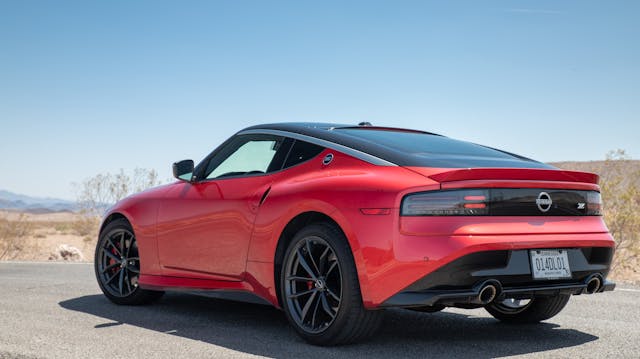
Nope. The 2023 Z touts a completely revised suspension, a more powerful engine with entirely different power delivery, and a new interior and exterior. The more pressing question is whether these changes retain the Z’s DNA and continue the model’s iconic reputation. This isn’t just idle curiosity: In recent years many performance cars have been tamed or made overly complicated in the name of modernization.
Marketplace
Buy and sell classics with confidence
Nissan provided to us automatic- and manual-equipped Performance-trim Zs for stints on the Las Vegas Motor Speedway’s 1.8-mile road course as well as a route from LVMS to nearby Lake Mead. In top-tier Performance trim (aside from the $52,000 Proto launch edition, of which only 240 will be made), both test cars started at $49,990 and came in at $53,610 and $53,210, respectively, the only difference being the automatic’s more expensive Passion Red TriCoat paint. The Performance brings a host of, well, performance features along with several interior accessories and materials. Larger brakes, a clutch-type mechanical limited-slip differential, 19-inch RAYS wheels shod in 240-treadwear Bridgestone Potenza S007 tires, and rev-matching for the manual or unique paddles for the automatic are part of the deal. Floor mats ($400) and illuminated kick plates ($500) were the only options on both cars. There are few a la carte add-ons, and specific items like big brakes or the limited-slip differential cannot be ordered individually on the base trim.
Nissan also let us try a Z in base (“Sport”) trim for acceleration runs. Here’s the buried lede in this story: The Sport starts at $39,990. 400 horsepower for $40 grand is very hard to come by. You’ll have to go pony car shopping at Ford or Chevy if you want to find a cheaper base price for 400+ ponies: everything else with that power starts well north of the Sport Z.
The 370Z’s design and that of the 350Z before it clearly nodded back to the original 240Z. The new Z does, too, but it also brings in cues from the ’90s 300ZX, which has only recently evolved from misunderstood used car to fast-appreciating classic. A child of the ’90s, I found myself most drawn to the 300ZX-influenced taillights. The cross-generational cues meld cleanly and evoke different elements of the Z-car bloodline without being excessively retro.
Hopping straight into the track session in the manual Performance trim, I quickly found a comfortable position with the rake- and height-adjustable seat bottoms, and the new telescoping steering column is a welcome addition. Potential track day users, take note: I’m 5’9”, and with the seat as low as it would go my helmet cleared the roof—if you’re a couple inches taller, yours may not. The seats achieve good lateral support without massive bolstering, which makes getting in and out a bit easier.
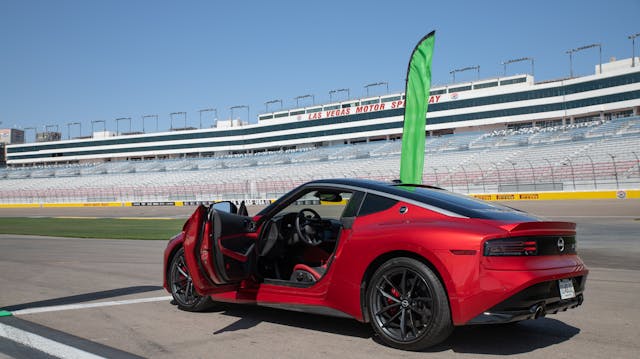
Accelerating away from pit lane I noticed minimal turbo lag—about 300 rpm to get into boost. The 3.0-liter twin turbo VR30DDTT engine comes over from the Infiniti Q50 nearly unchanged save for revised engine mapping and unique recirculation valves that help keep the turbos spooled up. Peak power arrives at 6400 rpm, and the 350 lb-ft of torque hits from 1600 to 5200 rpm. It feels strongest between 2500 and 6000 rpm. Power drop-off toward the 7000 rpm redline was slight, and the shift light sequence at the top of the new 12.3-inch center display helpfully reminded me it was time to change gears.
Grabbing the leather-wrapped shifter, I found a slightly notchy and mechanical-feeling unit with well-defined spacing and good throws. Nissan revised the gearbox’s synchronizers, so some of the crunch from the 370Z is gone. I’m not talking Miata shifter levels of enjoyable, but it is good and non-intrusive. Pedals are well-spaced for heel-and-toe shifting, or you can press the S-mode and let the Z rev match for you.
When it came time to woah down, the brakes—four-piston front, two-piston rear with vented rotors—delivered confident and consistent if slightly soft feel over our four-lap stints. That said, the heat visibly pouring from the driver’s front wheel at the end of such a short session made me wonder how even these larger brakes on the Performance trim would hold up in a 20+ minute session at a track with longer straights. This is picking nits for a street car, but be forewarned if open lapping is on your agenda.
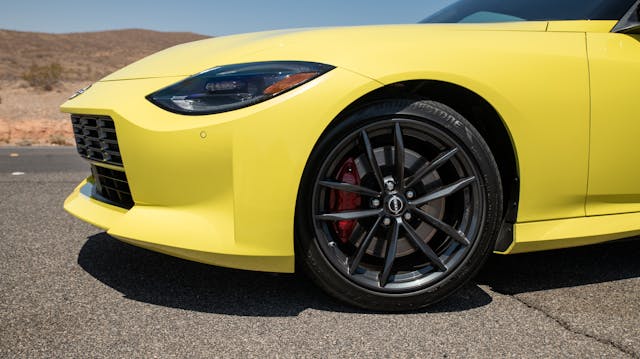
The decreasing radius turns of LVMS’ road course highlighted the old-school approach the Z’s development team took to handling. There’s no suspension mode fiddling here—just solid baseline tuning. Feeling a bit like a showroom stock SCCA car (fittingly so, as the 1970 240Z became the first Japanese car to take an SCCA National Championship in C Production), the Z pitched, dove, and squatted more than I expected. That doesn’t take away from the experience though—quite the opposite. It never feels out of sorts and communicates well once it takes a set. In an era when many manufacturers feel the need to over-stiffen a car’s suspension because they think consumers will equate that with “sporty,” Nissan engineers wisely went in the other direction. The Z manages to be playful and confidence-inspiring without imposing a harsh ride.
A bit of the twin turbo V-6 sits ahead of the front axle, and there’s the added weight of cooling hardware packed into the nose, so it’s no surprise that the Z tends toward mild understeer on turn-in at the limit. Despite that, it was very easy to modulate the line with the throttle as I squeezed around the long corners toward the late apexes. Easily controllable corner-exit oversteer is there if you want it.
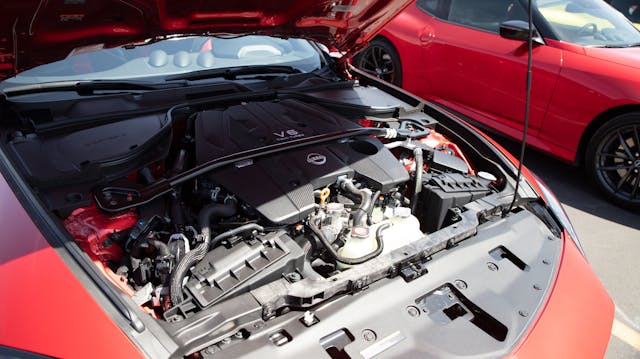
Similar to the suspension, the electric-assisted steering rack has one setting, and isn’t overly heavy for the sake of it. The new leather-wrapped wheel is just the right thickness, has good weight, and effectively communicates what the front Bridgestones are up to.
We also got to sample the new nine-speed automatic on track. Nissan’s team encouraged us to engage sport mode and let the transmission shift itself rather than using the paddles. In so doing, I discovered a dance partner that was a little too eager to lead. The transmission repeatedly decided to downshift after turn-in while I was on the edge of cornering adhesion, unsettling the car slightly and distracting me from my dive toward the apex. Although the automatic may be faster, drivers who want the most control will still be better off with the manual.
The automatic accelerated measurably more aggressively than the manual. A quick sample of Nissan’s new launch control demonstrated a no-drama, extremely smooth blast down the tarmac. Nissan did not share performance estimates, but considering that multiple outlets have clocked 0 to 60 mph in the heavier Q50 in 5 seconds or less, you can safely assume this car is quick, indeed.
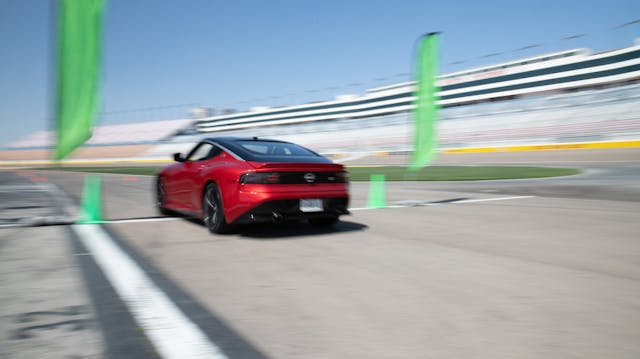
For those who can’t leave well enough alone, the Z has already had all its SEMA measurements taken and NISMO has some parts ready, with others in development—the Sport Z at our test had a preproduction Nismo exhaust that sounded excellent. There are tuners experienced in tweaking this engine, so the Z community isn’t going to have to wait long for more speed.
The Z proved a willing companion on the drive from LVMS to Lake Mead and demonstrated the benefits of the chassis team’s suspension tuning. Despite a 10.8 percent increase in torsional stiffness, the incrementally stiffer damping of the new monotube shocks, and higher-rate springs and sway bars, the Z deftly managed the construction zones and baked-asphalt washboard roads leaving the city without being jarring or uncomfortable. Long sweepers led to tighter undulating corners as I got closer to the ever-shrinking Lake Mead, and the Z was as engaging here at 6/10ths as it was on the track. After a couple hours spread over the manual and automatic cars, there’s every indication this car can happily serve as an appealing daily or road trip car while also being a capable backroad or track day partner.
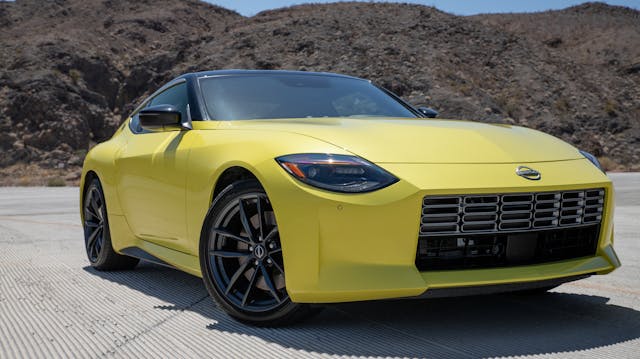
When you’re not hunting for apexes on track, you tend to pick up on a car’s traits differently. Out on the road I noticed that the Z’s engine can feel and sound a little harsh in the upper third of its rev range. It seemed more prevalent in the manual, probably because the automatic’s sport mode further amplifies engine sounds through the speakers. These were pre-production testers, though. Road noise was a bit more than I expected as well.
The cabin has an appealing design with leather and synthetic suede accents, an informative and easy-to-read electronic gauge cluster, and a nine-inch infotainment screen (the Sport trim makes do with an eight-inch display). The Z’s interior is a welcome change from the 370, which felt a bit threadbare even when it debuted all those years ago. Triple gauges atop the center of the dash, echoing prior generations, now read out boost, turbo rpm, and battery voltage.
The interior technology brings the Z current without chasing some of the more frustrating trends currently invading car cabins. What at first glance appear to be haptic buttons on the steering wheel are thankfully not, and the traditional HVAC knobs are easy to use on the go, even if the iconography on them is a bit small. Piano black plastic is limited to the steering wheel buttons, the surround of the center screen and the buttons beneath it. The infotainment functions smoothly and quickly, although the navigation did take a moment to boot up in the desert by Lake Mead. The eight-speaker Bose audio system, while not audiophile quality, is passable, with the aural center skewed forward toward the dash.
Despite Nissan’s team pointing out the recent upward trend of sports car sales, the number of offerings in the segment has shrunk over the years. You could cast a wide net to include pony cars and a stray BMW or two as the Z’s competition, but there’s no escaping a comparison to Toyota’s Supra. From a pricing perspective, the 400-hp base Z Sport undercuts even the 2.0-liter entry-level Supra by $3300, so if it’s outright speed you’re looking for between the two starter trims, the Z may be up your alley. With destination fees included, the Z Performance nestles just beneath the Supra 3.0 Premium’s $54,790 starting price. We look forward to the chance to drive them side by side.
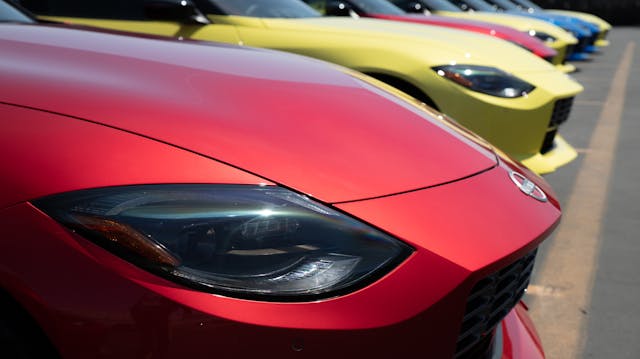
Much of the criticism around the new Supra has centered on the lack of a deep, mechanical connection to the Toyota-engineered models that came before. No one will ever be able to make that complaint about the latest Z-car, which indeed earns its shortened moniker. Whether you grew up with Datsun-badged 240Zs or turbo 300ZXs, you’ll find a lot that’s familiar and a lot to love. It’s not bleeding-edge tech, and the drivetrain could use a little refinement, but the new Z delivers affordable, exciting performance in a stunning package—staying true to the formula that’s given enthusiasts a decades-long soft spot for the model.
2023 Nissan Z
Price: $51,015 / $53,610 (base / as-tested, Performance); $41,015 (base, Sport)
Highs: Great handling without a harsh ride, beautiful styling.
Lows: NVH could be improved, track days may require stronger brakes.
Summary: An excellent road trip or back road partner, the reborn Z can wear its badge with pride.
